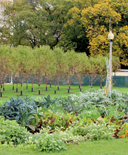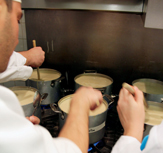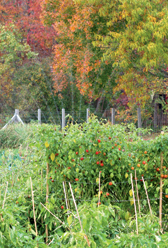FOR THE LOVE OF PLANTS:
VEGETARIANISM THROUGH THE AGES
“The gods created certain kinds of beings to replenish our bodies… the trees and the plants and the seeds.”
—PLATO
“I do feel that spiritual progress does demand at some stage that we should cease to kill our fellow creatures for the satisfaction of our bodily wants.”
—MOHANDAS GANDHI
“The average person doesn’t have a clue that the meat they’re eating is causing all this havoc. They don’t understand about the effects on the environment or on human cells. The suffering of the animals they might try to turn away from. So how to make them listen and understand is difficult, but it’s happening.”
—JANE GOODALL
For the first time in history, interest in vegetarianism is on its way to becoming mainstream. After being embraced by countless people over millennia, it is still not typical—with just 5 percent of American adults self-identifying as vegetarian (abstaining from all meat), and another 2 percent as vegan (abstaining from all meat, eggs, and dairy), according to a July 2012 Gallup poll—although these numbers are growing. However, when they are added to the more than 47 percent of adult Americans who acknowledge a wish to decrease their meat consumption (according to a 2011 USA Today report), one could argue that the desire to eat less or even no meat is finally becoming the norm. Four consecutive years of decline in U.S. meat consumption, from 2006 to 2010—the first on record—and USDA projections of further declines offer additional evidence that a profound shift is under way.
Eating vegetarian, and even vegan, is easier than ever before. The proliferation of dedicated vegetarian restaurants—from upscale Vedge in Philadelphia, which GQ named one of the best new restaurants of 2012, to fast-casual chains like Native Foods and Veggie Grill—not to mention vegetarian menu options everywhere from Chipotle and Subway to DANIEL and the French Laundry to countless independent Asian, Indian, Mediterranean, and other ethnic restaurants, makes vegetarian dining a no-brainer. At the same time, the rapid growth in farmers’ markets, CSAs, and vegetarian cookbooks and media have been a boon to home cooks. Even veganism is less challenging, as evidenced by more widespread availability of nondairy milks (which saw U.S. sales topping $1.4 billion in 2013), nondairy butters (e.g., Earth Balance) and nondairy cheeses (e.g., Daiya), as well as eggless mayonnaises (e.g., Vegenaise).
No longer exclusively the domain of countercultural “hippies,” vegetarianism and veganism are, well, hip, thanks to their endorsement by some of the most influential people of this era. Television personalities such as Ellen DeGeneres and Oprah Winfrey and popular entertainers including Kristen Bell, Russell Brand, Alan Cumming, Woody Harrelson, Anne Hathaway, Chrissie Hynde, Joan Jett, Jared Leto, Adam Levine, Jennifer Lopez, Tobey Maguire, Lea Michele, Morrissey, Natalie Portman, Prince, Alicia Silverstone, Carrie Underwood, and Forest Whitaker have thrust meatless diets into the media spotlight and helped to keep them there. Even BusinessWeek has profiled industry leaders who eschew meat, including Twitter cofounder Biz Stone and hotelier Steve Wynn, and perhaps most notably former President Bill Clinton, who lost 24 pounds after 2004 quadruple bypass surgery and 2010 stent surgery by switching to a vegan diet.
Vegetarianism has been around for as long as human beings themselves, and compelling arguments for abstaining from meat are numerous and timeless. A glance through history shows the various cultural, economic, environmental, ethical, global, medical, nutritional, patriotic, practical, religious, and other factors that have given rise to vegetarianism. On the heels of the teachings of world religions and Greek and Roman philosophers, an impressive number of history’s greatest geniuses—including da Vinci, Einstein, and Gandhi—lived some or all of their adult lives as vegetarians.
The advent of nutritional science in the twentieth century has established the relationship between diet and health, as well as demonstrated a correlation between consuming too much animal protein and many chronic diseases, including heart disease, certain cancers, and obesity. Groundbreaking studies republished in bestselling books like The China Study, reinforced by other efforts such as the popular “Meatless Monday” campaign, have helped make common knowledge out of this information. Former Beatle Sir Paul McCartney famously quipped, “If slaughterhouses had glass walls, everyone would be vegetarian.” Indeed, the Internet and YouTube have put just a click away horrifying video images of some of what goes on in the factory farms that supply 99 percent of the meat, eggs, and dairy products consumed in the United States, providing virtual “glass walls” that have been fueling the growing animal welfare movement. And facts, figures, and photos of what eating animals is doing to our most precious natural resources—our air, land, and water—make the reality too hard to ignore, leading even billionaire Bill Gates, who’s investing in companies developing vegan meat and egg replacements, to advocate a move toward vegetarianism as a way to save the planet and avoid the looming global food shortage crisis.
With such powerful champions and arguments, why isn’t everyone vegetarian yet? There are also powerful cultural, economic, and political forces underlying American society and its meat- and dairy-centric status quo. Turn on the TV, and you’ll find a seemingly endless stream of ads promoting meaty, cheesy fast food, followed by another endless stream of ads for pharmaceuticals that promise relief from the ailments often correlated with overconsuming such products.
Government policy is arguably more supportive of big business that contributes mightily to the U.S. economy than of the health of its individual citizens (especially our children, whose obesity-driven diabetes epidemic is leading to tragic predictions of shorter lifespans). Commodity products like corn and soybeans that are fed to livestock are subsidized with taxpayer dollars, as are the meat and dairy industries themselves, which in 2011 benefited directly or indirectly from 63 percent of government agricultural subsidies, while fruit and vegetable producers received less than 1 percent. Over the past fifty years, those representing the interests of the meat and dairy industries have sometimes been the ones setting our country’s nutritional policy guidelines (as a 2000 court ruling determined), despite the obvious conflicts of interest.
But it’s becoming clearer every day that moving toward vegetarianism is better for your health, better for the health of other living beings, and better for the planet as a whole. While you don’t have to be a full-time vegetarian to reap the benefits, I hope that you’ll discover—as I have—that eating vegetarian is so delicious and makes you feel so much better, lighter, and more energetic, that you’ll opt to maximize these benefits by eliminating as much meat as you choose. And I do believe it’s important to emphasize that what you choose to eat is a personal decision—one best made by fully understanding how eating animals affects your personal health and well-being, that of your family and others, and that of our planet.
“If anyone wants to save the planet, all they have to do is stop eating meat.”
—SIR PAUL MCCARTNEY
Choosing to not eat meat, or even to eat less of it, is a simple yet powerful way to be a part of the solution to some of the most pressing problems of today and tomorrow. Think of vegetarianism as presenting a spectrum of choices:

Fully 93 percent of the population does not self-identify as wholly vegetarian or vegan. Bestselling author Dr. John McDougall counts himself among that majority, even though he has espoused the health benefits of a low-fat vegan diet for decades while eating a 99+ percent meatless diet himself. He explains, “I do not want to be thought of as a vegetarian because so many people who call themselves vegetarians are unhealthy,” citing a soy burger, French fries, and Coca-Cola as a vegetarian meal. I also count myself among that 93 percent, even though I have eaten a 99+ percent meatless diet since May 2012. I believe labels can be divisive, emphasizing differences rather than bringing people together—and bringing people together can be one of food’s greatest benefits and pleasures.
Clearly, nonvegetarians fall along a broad spectrum representing a wide range of diets. Omnivores (people who eat everything, both animals and plants) can choose to limit the amount of meat they eat, making them “semi-vegetarians” or “flexitarians.” Some eat no meat other than fish and are called “pescetarians.” “Vegetarian” typically describes those who abstain from meat (including red meat, poultry, and seafood). “Lacto-vegetarians” are vegetarians who also abstain from eggs but not dairy, while “ovo-vegetarians” are vegetarians who abstain from dairy but not eggs. “Vegan” is used to describe vegetarians who abstain from both dairy and eggs (and, depending on one’s personal definition, often other animal-derived products, such as gelatin and honey). As McDougall suggests, a healthful vegetarian or even vegan diet is about what you choose to eat as much as what you choose not to eat, which is why a “whole-food, plant-based diet” has become the catchphrase for this healthful approach to eating.
Ultimately, the decisions each of us makes throughout the day give us the opportunity to create the future of food—and the world—by voting with our forks. The 1960s taught us that “the personal is political” and that how we choose to live our lives is our statement of who we are. “We are what we eat” sums this up succinctly. Believing the dictum that “those who cannot remember the past are condemned to repeat it,” this book begins with a broad-brush overview of the roots of vegetarianism and our fast-growing enjoyment of a plant-based diet, by way of a timeline highlighting some of the key influencers and organizations, classic books, notable events, and other milestones that have influenced this shift.
SOME NOTABLE EVENTS IN VEGETARIAN HISTORY
YEAR: ~3000–2000 BCE
EVENT: One of the world’s most ancient religions, Hinduism, teaches that humans should not inflict pain on other animals, leading to the peaceful and compassionate practice (or sadhana, which means “spiritual practice”) of vegetarianism.

“You must not use your God-given body for killing God’s creatures, whether they be human, animals, or whatever.”
—YAJUR VEDA (12.32), SACRED HINDU TEXT
YEAR: ~500s BCE
EVENT: Chinese sage Lao Tzu (c. 604–531 BCE) writes the classic Chinese text Tao Te Ching, which gives rise to Taoism, one of the three primary religions of China (along with Buddhism and Confucianism), which calls for doing no harm to any other life form.
YEAR: ~500s BCE
EVENT: Greek philosopher Pythagoras (c. 570–495 BCE), the man whose theorem a2 + b2 = c2 rocked the field of geometry, leads what is thought to be the first community requiring a vegetarian diet and is described in Ovid’s Metamorphoses as “the first to censure man for eating the flesh of animals.” People who abstained from eating meat were often called “Pythagoreans” before the term “vegetarian” was coined in the late nineteenth century.
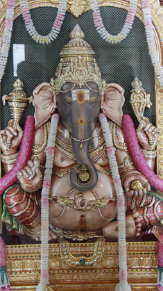
“Animals share with us the privilege of having a soul.”
—PYTHAGORAS
“Mortals, refrain from defiling your bodies with sinful feasting, for you have the fruits of the earth and of arbors, whose branches bow with their burden; for you the grapes ripen, for you the delicious greens are made tender by cooking; milk is permitted to you too, and thyme-scented honey: Earth is abundantly wealthy and freely provides you her gentle sustenance, offered without any bloodshed.”
—THE CHARACTER OF PYTHAGORAS, IN OVID’S IN METAMORPHOSES, BOOK XV (8 CE)
YEAR: ~500s BCE
EVENT: After forty-nine days of meditation, Siddhartha Gautama (c. 563–483 BCE) achieves enlightenment, becoming the Buddha and inspiring Buddhism, which forbids harming any living creature, and millions of Buddhist followers who practice vegetarianism. He encourages his followers to eat spinach.
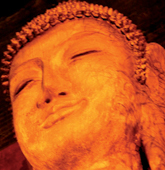
“The eating of meat extinguishes the seed of great compassion.”
—BUDDHA
YEAR: ~500s BCE
EVENT: Prince Vardhamana (Nigantha Nataputta), or Mahavira (c. 540–510 BCE), founds Jainism, one of India’s primary religions, which values animal rights and forbids the taking of life (whether an insect or a root vegetable). Vegetarianism is mandatory for followers.
YEAR: ~400s BCE
EVENT: In The Laws, Greek philosopher Plato (429–347 BCE) notes the relationship between one’s diet and one’s conduct. In The Republic, the character Socrates asserts that the ideal city would be vegetarian, saying that meat is a luxury that leads to decadence and war. He also questions the excessive amount of land needed to raise cattle.
YEAR: 8 CE
EVENT: The Roman poet Ovid (c. 43 BCE–17 CE) writes Metamorphoses, which includes a speech in the voice of Pythagoras, urging abstinence from eating meat and the abandonment of animal sacrifice.
YEAR: ~100 CE
EVENT: Greek philosopher Plutarch (c. 46–120 CE), a vegetarian, writes a number of pro-vegetarian essays, including On the Eating of Flesh. In the nineteenth century, the Oxford graduate and Romantic poet Percy Shelley (1792–1822) will translate them into English and become a vegetarian himself.
YEAR: ~200s CE
EVENT: The Greek philosopher Porphyry (233–304), a practicing vegetarian, revives interest in Plato’s philosophy.
YEAR: 1400s
EVENT: Leonardo da Vinci (1452–1519), widely considered history’s greatest genius, is one of the first important ethical vegetarians since ancient times to oppose meat-eating on humanitarian grounds. He is said to have frequently bought live birds for sale as food at the market in Florence just to set them free.
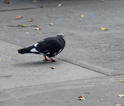
“You needn’t be a genius to be a vegetarian, but many geniuses—including Leonardo da Vinci, Albert Einstein, Gandhi, and Nikola Tesla—endorsed vegetarianism.… Andrea Corsali, an Italian explorer, wrote a letter to his sponsor Giuliano de′ Medici in which he noted the meatless diet of the [Indian] Gujurati peoples he observed in his travels. Corsali writes that in addition to avoiding meat, they do not ‘permit among them any injury be done to any living thing,’ and then he adds, ‘like our Leonardo da Vinci.’ ”
—MICHAEL GELB, AUTHOR OF HOW TO THINK LIKE LEONARDO DA VINCI
YEAR: 1699
EVENT: John Evelyn (1620–1706) writes Acetaria: A Discourse of Sallets, advocating the eating of salads and providing what’s been since called “the world’s first A–Z of salad ingredients,” classifying dozens of herbs by their appropriateness for cooking versus being served uncooked.
YEAR: 1732
EVENT: German settlers in Pennsylvania, led by Johann Conrad Beissel (1691–1768), create the Ephrata Cloister, which advocates vegetarianism as a path to spiritual goals and which by its dissolution in 1813 has become the longest-lived commune in America. The physical site is still open for daily tours.
YEAR: 1790s
EVENT: Massachusetts native John Chapman—better known as Johnny Appleseed (1774–1845)—begins his journey to sow apple seeds throughout the Midwest. A vegetarian follower of Christian mystic Emanuel Swedenborg, he is said to have subsisted mainly on foraged nuts and berries.
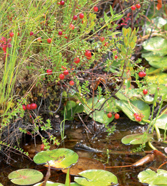
YEAR: 1809
EVENT: The Reverend William Cowherd (1763–1816), founds the Bible Christian Church (BCC) near Manchester, England, and advocates for abstinence from eating meat. The BCC is now credited as the forerunner of modern vegetarianism.
YEAR: 1813
EVENT: Inspired by Return to Nature, or, A Defence of the Vegetable Regimen by his friend John Frank Newton (1766–1837), Percy Shelley (1792–1822) makes the case for vegetarianism in his essay “A Vindication of Natural Diet,” which argues against the waste of both animal life and valuable land.
“The most fertile districts of the habitable globe are now actively cultivated by men for animals, at a delay and waste of aliment absolutely incapable of calculation.”
—PERCY SHELLEY
YEAR: 1817
EVENT: The Reverend William Metcalfe (1788–1862) and forty other pilgrims from Manchester’s Bible Christian Church (BCC) sail to America to establish the vegetarian sect in Pennsylvania.
YEAR: 1821
EVENT: Martha Brotherton—wife of Joseph, who was a preacher at the Bible Christian Church and a leader in the Vegetarian Society—writes one of the first vegetarian cookbooks, A New System of Vegetable Cookery.
YEAR: 1837
EVENT: The first American book dedicated to the subject of bread, A Treatise on Bread, and Bread-Making by Sylvester Graham (1794–1851) is published. He travels to preach the virtues of whole wheat bread (arguing that to separate the bran from the rest of the wheat berry was “against the will of God”) and vegetarianism, and is so persuasive that his followers become known as Grahamites. He is credited both with influencing New York Tribune founder Horace Greeley to become a vegetarian and with inspiring the creation of the whole wheat flour–based Graham cracker.
YEAR: 1837
EVENT: On March 7, in Boston, William Alcott and Sylvester Graham are among the founders of the American Physiological Society (APS). The organization’s constitution states that “the farinaceous vegetables” are “the best food for man.”
“The APS also moved meat abstention away from religious doctrinal structures and placed dietary reform firmly within the realm of scientific study.”
—ADAM D. SHPRINTZEN, IN THE VEGETARIAN CRUSADE (2013)
YEAR: 1838
EVENT: William Andrus Alcott (1798–1859) writes Vegetable Diet: As Sanctioned by Medical Men, and By Experience in All Ages. This popular book, one of the first American books to espouse a vegetarian diet, includes the chapter “A Vegetable Diet Defended,” which makes seven key arguments for vegetarianism: “1) The Anatomical Argument, 2) The Physiological Argument, 3) The Medical Argument, 4) The Political Argument, 5) The Economical Argument, 6) The Argument from Experience, 7) The Moral Argument.” Alcott advocates replacing meat-based breakfasts with grain-based dishes, such as brown bread (also known as Graham bread), boiled rice, or rye toast.
YEAR: 1838
EVENT: Alcott House, named after educational reformer Bronson Alcott, is established in England as a spiritual school embracing vegetarian principles. It thrives over the next several years, giving rise to the first Vegetarian Society in 1847.
“Asked to write a few words of introduction to Vegetable Diet, I sat down to read it, expecting to find quaint and cobwebby ideas. I found instead, from Alcott and his hundred or so contributors, including philosophers and poets, ideas that are at the heart of the discussion about food today, from academia to tabloid talk shows—comments on health, sustainability, ethics, and even the safety of the food supply.”
—ANNA THOMAS, AUTHOR OF THE VEGETARIAN EPICURE, IN HER INTRODUCTION TO THE 2012 EDITION OF WILLIAM ANDRUS ALCOTT’S 1838 VEGETABLE DIET
YEAR: 1842
EVENT: The word “vegetarian” is used in print for the first time (in The Healthian, a publication of Alcott House) to describe the consumption of only plants, in accordance with the common meaning of the word “vegetable” at that time, which included fruits and grains.
YEAR: 1843
EVENT: The British and Foreign Society for the Promotion of Humanity and Abstinence from Animal Food is formed.
YEAR: 1843
EVENT: (Amos) Bronson Alcott (1799–1888), a relative and neighbor of William Alcott, and his family (including daughter Louisa May Alcott, the future author of Little Women) and followers found America’s first vegetarian commune in Harvard, Massachusetts. The farm is named “Fruitlands.”
YEAR: 1847
EVENT: The first Vegetarian Society is formed on a September evening at a coastal hospital in England. Within a year, it grows from 150 to 265 members, ranging in age from fourteen to seventy-six. Before the end of the century, vegetarian societies form in many other countries, including the U.S. (1850), Germany (1867), Austria (1878), France (1879), Switzerland (1880), New Zealand (1882), Hungary (1884), Australia (1886), India (1889), Ireland (1890), Chile (1891), Netherlands (1894), Sweden (1895), Denmark (1896), Belgium (1897), and Italy (1899).
YEAR: 1850
EVENT: During a time when most people believe illness to be a mystery or the will of God, on May 15 at Clinton Hall in New York City, the Presbyterian minister turned health reformer Sylvester Graham (1794–1851) co-founds the American Vegetarian Society with Rev. William Metcalfe (1788–1862) and Dr. William Alcott (1798–1859, who serves as its first president), with significant support from the Bible Christian Church (BCC).

YEAR: 1853
EVENT: At a banquet held by the American Vegetarian Society, vegetarian suffragist Susan B. Anthony (1820–1906) raises a toast to both vegetarianism and women’s rights.
YEAR: 1854
EVENT: Henry David Thoreau (1817–1862)’s Walden, an account of his experiment in living in solitude on Walden Pond in Massachusetts, is published.
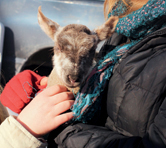
“I have no doubt that it is a part of the destiny of the human race, in its gradual improvement, to leave off eating animals.”
—HENRY DAVID THOREAU
YEAR: 1860
EVENT: John Smith, of Yorkshire, England, writes The Principles and Practices of Vegetarian Cookery, which includes a substantial amount of theory (“being an attempt to prove from history, anatomy, physiology, and chemistry, that the original, natural, and best diet of man is derived from the vegetable kingdom”) as well as several hundred recipes.
YEAR: 1863
EVENT: Ellen G. White (1827–1915), husband James White, and others found what is now known as the Seventh-day Adventist Church in Battle Creek, Michigan. In June, she reports visions from God inspiring her to promote a meatless diet. Three years later, the couple founds the Western Health Reform Institute, which later achieves world renown as the Battle Creek Sanitarium under the leadership of John Harvey Kellogg.

YEAR: 1868
EVENT: Influenced by Sylvester Graham, James Caleb Jackson (1811–1895)’s How to Treat the Sick Without Medicine is published, promoting a fruit- and grain-based diet, such as the one served at Our Home on the Hillside, a Dansville, New York–based sanitarium where he invents the first cold grain-based breakfast cereal, which he dubs “Granula” (Latin for “little grains”), and which serves as an inspiration for the Whites’ Battle Creek institute.
YEAR: 1881
EVENT: Anna Kingsford (1846–1888), one of the first English women to earn a medical degree, writes about the benefits of vegetarianism in The Perfect Way in Diet and helps found the Food Reform Society. She travels throughout Europe to speak out about vegetarianism and against animal experimentation (which she notably managed to avoid in medical school).
YEAR: 1883
EVENT: The first book of vegetarian history, The Ethics of Diet, is written by Howard Williams (1837–1931). It will influence vegetarians from Leo Tolstoy to Henry Salt to Mohandas Gandhi.
“The use of animal food… is simply immoral, as it involves the performance of an act which is contrary to moral feeling—killing.”
—LEO TOLSTOY
YEAR: 1888
EVENT: The London Vegetarian Society is formed, with its own publication, The Vegetarian.
YEAR: Late 1800s
EVENT: A Seventh-day Adventist for much of his life, John Harvey Kellogg (1852–1943) works during his youth as an errand runner for Ellen and James White, after which they sponsor his medical education at an Adventist-run school in New Jersey. Upon graduation, he is hired by—and later heads—the Battle Creek Sanitarium (originally the Western Health Reform Institute). During a time when a typical breakfast might feature sausage and whiskey, the noted surgeon develops for the sanitarium dozens of innovative meatless foods—most notably flaked and ready-to-eat breakfast cereals, which will revolutionize the morning meal within a decade. The sanitarium attracts leading celebrities of the day, including Amelia Earhart, Thomas Edison, Henry Ford, Mary Todd Lincoln, John D. Rockefeller, President Taft, Sojourner Truth, and Johnny Weissmuller. Kellogg becomes the leading promoter of vegetarianism in his time, and the success of the W. K. Kellogg Company (run by his brother Will Keith) inspires the founding of other national companies providing ready-to-eat cereals that often replace breakfast meats.
“There is nothing necessary or desirable for human nutrition to be found in meats or flesh foods, which are not found in and derived from vegetable products.”
—DR. JOHN HARVEY KELLOGG, IN THE NEW DIETETICS: WHAT TO EAT AND HOW
YEAR: 1890
EVENT: After a St. Louis doctor suggests grinding peanuts as a source of protein for elderly patients unable to chew meat, George Bayle begins to sell peanut butter commercially. Five years later, Dr. John Harvey Kellogg registers the first patent for a peanut-based “Process of Preparing Nut Meal,” which is served at the Battle Creek Sanitarium as a healthful meat substitute. By 1899, the U.S. is producing an estimated two million pounds. After being featured at the 1904 St. Louis World Fair, sales of peanut butter skyrocket to approximately 34 million pounds by 1907.
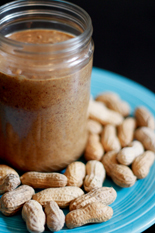
YEAR: 1892
EVENT: Leo Tolstoy (1828–1910) writes his influential vegetarian essay “The First Step” as the preface to the Russian translation of The Ethics of Diet.
YEAR: 1893
EVENT: Ella Eaton Kellogg (1853–1920), wife of Dr. John Harvey Kellogg, writes her first vegetarian cookbook, Science in the Kitchen.
YEAR: 1895
EVENT: New York’s first vegetarian restaurant—the aptly named Vegetarian Restaurant Number 1—is opened by the New York Vegetarian Society in the Hotel Byron on West 23rd Street. (By comparison, in 1897 there are thirteen vegetarian restaurants in London.) Within five years, a chain of vegetarian cafes called Pure Food will also serve meatless meals in Manhattan. Within thirty-five years, a chain of three vegetarian restaurants called Farmfood will serve meatless meals on the west side of Manhattan.
YEAR: 1898
EVENT: The Vegetarians’ Home and Teetotaller Café, later renamed Hiltl, opens in Zurich. Said to be the world’s oldest continuously-operating vegetarian restaurant, it still operates today, and the owners have added a chain of vegetarian fast food spots called Tibits by Hiltl.
YEAR: 1899
EVENT: Influenced by poet Percy Shelley’s poems and pamphlets, animal welfare activist Henry Salt (1851–1939) writes his classic book The Logic of Vegetarianism, which later influences Mohandas Gandhi to renew his commitment to vegetarianism. He also introduces Gandhi to the writings of Thoreau, including Civil Disobedience, which Gandhi cites as a major influence. Salt is considered the first writer to champion animals’ rights, via his 1894 Animals’ Rights, versus mere animal welfare reform.
YEAR: 1900
EVENT: Chicago’s first vegetarian restaurant, Pure Food Lunch Room, opens at 176 E. Madison in the Loop.
YEAR: 1900
EVENT: Noted scientist and inventor (a rival of Thomas Edison, he has been called “inventor of the electrical age”) Nikola Tesla (1856–1943) writes an article titled “The Problem of Increasing Human Energy” for the June issue of Century Illustrated, in which he calls “want of healthful nutriment” the “chief evil,” condemns the inefficiency of raising animals as food, and praises vegetarianism. Over his adult life, he shifts away from meat toward fish and then finally to a vegetarian diet.
“It is certainly preferable to raise vegetables, and I think, therefore, that vegetarianism is a commendable departure from the established barbarous habit. That we can subsist on plant food and perform our work even to advantage is not a theory, but a well-demonstrated fact. Many races living almost exclusively on vegetables are of superior physique and strength. There is no doubt that some plant food, such as oatmeal, is more economical than meat, and superior to it in regard to both mechanical and mental performance.… In view of these facts every effort should be made to stop the wanton and cruel slaughter of animals, which must be destructive to our morals. To free ourselves from animal instincts and appetites, which keep us down, we should begin at the very root from which we spring: we should effect a radical reform in the character of the food.”
—NIKOLA TESLA, “THE PROBLEM OF INCREASING HUMAN ENERGY”
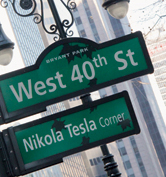
YEAR: 1901
EVENT: The first Vegetarian Society is formed in Russia. After the 1917 revolution, vegetarianism will be declared illegal in Soviet Russia, leading to the closing of its vegetarian societies and restaurants.
YEAR: 1902
EVENT: Pulp publishing magnate Bernarr Macfadden (1868–1955) opens his first Physical Culture vegetarian restaurant in lower Manhattan. Within six years, it is a successful chain with locations in Boston, Buffalo, New York City, Philadelphia, Pittsburgh, and Chicago. He also writes more than one hundred books, espousing a diet made up mostly of fresh fruits, vegetables, and whole grains as vital to good health—a revolutionary concept at the time.
YEAR: 1906
EVENT: After a spate of stockyard scandals, the novel The Jungle, by Upton Sinclair (1878–1968), is published, revealing the revoltingly unsanitary conditions and inhumane labor practices at Chicago stockyards. It becomes an instant bestseller, and fuels both the growing vegetarian movement and the addition of meatless entrees (from omelets to pastas) on mainstream restaurant menus.
YEAR: 1907
EVENT: On September 24, a New York Times article titled “Cancer Increasing Among Meat Eaters… on the Other Hand, Italians and Chinese, Practically Vegetarians, Show the Lowest Mortality of All” reports on Chicago-based Dr. G. Cooke Adams’ seven-year study indicating higher cancer risk among those who eat meat, stating, “Dr. Adams has proved conclusively that diet is a most important factor in the increase in the disease and its death rate.”
“There cannot be the slightest question that the great increase in cancer among the foreign-born over the prevalence of that disease in their native countries is due to the increased consumption of animal foods, particularly those derived from diseased animals.”
—DR. G. COOKE ADAMS, IN THE NEW YORK TIMES (SEPTEMBER 24, 1907)
YEAR: 1908
EVENT: The International Vegetarian Union is formed to unite vegetarian societies around the world and to organize a global conference in a different part of the world every two or three years.
YEAR: 1908
EVENT: The June issue of the Vegetarian Society of Great Britain’s magazine Vegetarian Messenger reports that during a recent bout of mastoiditis, American inventor Thomas Edison (1847–1931) “ceased using meat and went for a thorough course of vegetarianism. Mr. Edison was so pleased with the change of diet that, now he has regained his normal health, he continues to renounce meat in all its forms.”
“The doctor of the future will give no medicine, but will instruct his patient in the care of the human frame, in diet and in the cause and prevention of disease.”
—THOMAS EDISON, “EDISON HAILS ERA OF SPEED,” FORT WAYNE SENTINEL (DECEMBER 31, 1902)
YEAR: 1917
EVENT: The United States enters World War I in April, leading head of the U.S. Food Administration Herbert Hoover to launch “Meatless Mondays” and “Wheatless Wednesdays” to inspire Americans to reduce their consumption of these staple foods to help increase exports to starving allies in Europe. More than 13 million American families—the majority—pledge their participation over the course of U.S. involvement (ending in November 1918). Millions also plant liberty and war gardens, which will later be called victory gardens.
YEAR: 1920s
EVENT: Soy food products, such as soy bread, cereal, cheese, coffee, ice cream, milk, and nuts, are developed and promoted to a wider audience by Seventh-day Adventists such as T. A. Van Gundy (1874–1935) and Jethro Kloss (1863–1923).
YEAR: 1925
EVENT: Irish playwright George Bernard Shaw (1856–1950), a vegetarian who in 1901 famously quipped, “I was a cannibal for twenty-five years. For the rest I have been a vegetarian,” is awarded the Nobel Prize for Literature.
“It is nearly fifty years since I was assured by a conclave of doctors that if I did not eat meat I should die of starvation.”
—GEORGE BERNARD SHAW, THE QUINTESSENCE OF G.B.S.
YEAR: 1929
EVENT: A Saturday Evening Post article reports that as a result of “Meatless Monday” and other World War I dietary changes, “Americans began to look seriously into the question of what and how much they were eating. Lots of people discovered for the first time that they could eat less and feel no worse—frequently much better.”
YEAR: 1929
EVENT: The stock market crash of October 29 sets off the Great Depression, a time when farmers are producing lots of food that few can afford to purchase—so Americans go hungry, and farmers start going out of business. This leads to the first Farm Bill, passed in 1933 as part of FDR’s New Deal, and the updated Agricultural Adjustment Act of 1938, which stipulates that the Farm Bill be updated every five years, as it is to this day.
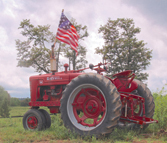
YEAR: 1930s
EVENT: Sadie Schildkraut (1899–1981), known as the “mother of cooked vegetarian dishes,” runs a chain of fifteen vegetarian restaurants throughout New York City. Yidisher Vegetarian Society of New York members, who view vegetarianism as a moral philosophy, dine on signature dishes such as mushroom cutlets, protose steak, and creamed beets.
YEAR: 1931
EVENT: Mohandas Gandhi (1869–1948) helps to launch the vegan movement in London on November 20. He credits the writings of Leo Tolstoy and Henry David Thoreau with greatly influencing his philosophy of nonviolence. While other Indian students renounce their vegetarianism in carnivorous England, he is influenced by Henry Salt’s A Plea for Vegetarianism to re-commit to it. After joining the London Vegetarian Society, he is elected to its executive committee and contributes articles to its newspaper.
“I do feel that spiritual progress does demand at some stage that we should cease to kill our fellow creatures for the satisfaction of our bodily wants.”
—MOHANDAS GANDHI
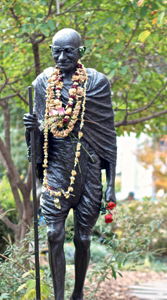
YEAR: 1932–1934
EVENT: In the U.K., the People’s League of Health and the Gowland Hopkins Committee report major problems with the safety of dairy, with a minimum of 40 percent of tested dairy cows being infected with tuberculosis and chronically transmitting it to a huge portion of the country’s human population. (In 1930, 58 percent of a sample of London children test positive for tuberculosis exposure.)
YEAR: 1934
EVENT: Automaker Henry Ford (1863–1947), a vegetarian who believes in reincarnation and is a soybean fanatic, showcases soybean dishes (such as cookies and puree) at the Century of Progress Exposition in Chicago.
YEAR: 1939
EVENT: Jethro Kloss’s book on herbal medicine, natural foods, and home remedies, titled Back to Eden, is published and goes on to sell more than four million copies and to help inspire the natural foods movement of the 1960s and 1970s.
YEAR: 1941
EVENT: The United States enters World War II. Americans are encouraged to plant “victory gardens”—in back yards, front yards, vacant lots, and even public land, from the Boston Commons to San Francisco’s Golden Gate Park (which at one point has eight hundred gardens)—to grow their own food. In 1943, U.S. rations limit families to twenty-eight ounces of meat per week. Over the course of the war, more than 20 million such gardens cumulatively produce more than 40 percent of the fresh vegetables consumed in the U.S.
YEAR: 1942
EVENT: B&H Dairy kosher vegetarian restaurant (mostly meatless, though lox is served) is opened by Abie Bergson and his partner Heller at 127 Second Avenue in New York City. Today, B&H still serves its housemade soups, pierogi, and specialties like vegetarian cutlet with kasha and mushroom gravy, along with a “vegetarian liver” made from eggs, onions, soybeans, and a not-so-secret ingredient: “love.”

YEAR: 1944
EVENT: The term “vegan” is coined by Donald Watson (1910–2005), a woodworker in Britain, to describe vegetarians who do not consume dairy or eggs. He even specifies in his Vegan Society newsletter how it should be pronounced: “Veegan, not Veejan.”
YEAR: 1945
EVENT: The New York Times Magazine runs the story “Heyday for the Vegetarians” on vegetarians’ efforts to convert meat eaters in the wake of meat shortages. Symon Gould, an editor of American Vegetarian magazine, classifies the hierarchy of vegetarians.
“First, and noblest, is the ethical vegetarian, who refuses to eat meat on moral or philosophical grounds.… Second is the religious vegetarian [who] does not eat meat because of the dictates of his religion.… Third is the esthetic vegetarian, who would rather avoid… the grey, parboiled flesh of a dead animal.… Fourth is the scientific vegetarian, who has compared the anatomies of the animal world and has decided that man is by nature a herbivorous animal and not meant to eat meat at all.… And fifth… are the dietetic vegetarians, who eat no meat only because it’s healthier not to.”
—SYMON GOULD, QUOTED IN THE NEW YORK TIMES MAGAZINE (1945)
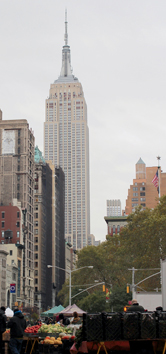
YEAR: Post-WWII
EVENT: The United States, which had built ten large-scale munitions factories by the end of the war, sees their production shift from bombs to fertilizers. Agribusiness is born as large-scale farming becomes a chemical-based process.
YEAR: 1948
EVENT: Dr. Catherine Nimmo and Rubin Abramowitz found a Vegan Society in California, which continues to 1960.
YEAR: 1948
EVENT: The Framingham Heart Study is established in Massachusetts to identify the factors contributing to cardiovascular disease. The half-century-plus study spurs the publication of 1,200 articles in leading medical journals on key risk factors such as obesity, smoking, high fat diet, high blood pressure, and diabetes.
“If Americans adopted a vegetarian diet, the [heart disease epidemic responsible for the death of half of all Americans] would disappear.”
—DR. WILLIAM CASTELLI, FORMER DIRECTOR OF THE FRAMINGHAM HEART STUDY, ON THE PBS/SCIENTIFIC AMERICAN FRONTIERS EPISODE “AFFAIRS OF THE HEART”
YEAR: 1949
EVENT: The First American Vegetarian Convention is held in August at Lake Geneva, Wisconsin.
YEAR: Mid–1900s
EVENT: The advent of nutritional science leads vegetarianism to be embraced as a healthful dietary option.
YEAR: 1958
EVENT: After spending his young adult years growing his hair long and living off the land in California as one of about a dozen “Nature Boys,” Robert Bootzin (1914–2004)—later known as Gypsy Boots—opens the first health-food restaurant in Los Angeles, known as the Back to Nature Health Hut, which attracts a celebrity clientele including Pat Boone, Red Buttons, Angie Dickinson, George Hamilton, and Gloria Swanson. Through more than twenty appearances on Steve Allen’s popular talk show and several books, he introduces a wide American audience to the idea of a healthful vegetarian diet and edibles such as figs, garlic, wheatgrass, and “smoothies.”
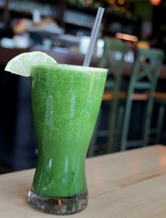
YEAR: 1960
EVENT: H. Jay Dinshah (1933–2000) establishes the American Vegan Society in New Jersey. His wife, Freya Dinshah, will write The Vegan Kitchen, the first American book to use the word “vegan,” in 1965, and will run the AVS after his death.
YEAR: 1961
EVENT: An editorial in the Journal of the American Medical Association (JAMA) asserts that “a vegetarian diet can prevent 90 percent of our thrombo-embolic disease and 97 percent of our coronary occlusions.” The statement is widely reported by vegetarian publications in subsequent years.
YEAR: 1962
EVENT: Rachel Carson’s book Silent Spring is published, helping to spur the global environmental movement, including the focus on organic methods of production, and encouraging some to move toward vegetarianism.
“In the diet in the average home, meats and any products derived from animal fats contain the heaviest residues of chlorinated hydrocarbons [i.e., pesticides]. This is because these chemicals are soluble in fat. Cooking does not destroy residues.”
—RACHEL CARSON, IN SILENT SPRING (1962)
YEAR: 1967
EVENT: The Tassajara Zen Mountain Center, the first Zen training monastery outside of Asia, is established in the San Francisco Bay area, with Edward Espé Brown becoming the head cook. Three years later, he writes The Tassajara Bread Book, which features Buddhist vegetarian recipes and goes on to sell a million copies. In 1971, Brown is ordained as a Zen priest. In 1973, he comes out with his second cookbook, Tassajara Cooking. He will later be the subject of Doris Dörrie’s 2007 documentary How to Cook Your Life.
YEAR: 1968
EVENT: Manhattan socialite and radio host Pegeen Fitzgerald sees her book Meatless Cooking: Pegeen’s Vegetarian Recipes published, and it proves popular with the two million listeners of the radio show that she and her husband co-host. Her 1989 New York Times obituary says she headed two animal welfare organizations and “believed deeply in antivivisection and ethical vegetarianism, refusing to eat meat or fish or to wear a fur coat ‘because I don’t want any living thing killed for my own use or pleasure.’”
YEAR: 1968
EVENT: Ten Talents, by nutritionist Rosalie Hurd and her physician husband Frank Hurd, is published, becoming one of the first few vegetarian/vegan resources available. (The 2012 edition of the Genesis 1:29–inspired cookbook is its forty-ninth printing.)
YEAR: 1968
EVENT: The Beatles study transcendental meditation in India. Afterward, George Harrison, John Lennon, Paul McCartney, and Ringo Starr declare their vegetarianism, inspiring others around the globe to follow suit. All but Lennon will remain lifelong vegetarians.
YEAR: 1969
EVENT: On April 1, Silver Star–decorated Marine and World War II veteran Jim Baker (also known as “Father Yod”) opens The Source on Sunset Boulevard, one of the first hugely popular vegetarian restaurants in Los Angeles. It features a menu of items (such as lentil-based veggie burgers) said to be “consciously prepared for the highest vibration” and attracts a celebrity clientele said to include Warren Beatty, Marlon Brando, Julie Christie, Jane Fonda, Goldie Hawn, Don Johnson, John Lennon, Steve McQueen, Carl Reiner, and Donald Sutherland. (In the 1977 film Annie Hall, Woody Allen’s character Alvy Singer visits The Source, ordering “alfalfa sprouts and mashed yeast.”) The restaurant will become the subject of the 2007 book The Source: The Untold Story of Father Yod, Ya Ho Wa 13, and the Source Family by Isis Aquarian with Electricity Aquarian, upon which Jodi Wille and Maria Demopoulos’s 2013 documentary The Source Family is based.
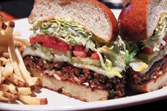
YEAR: 1970
EVENT: The first Earth Day is held on April 22, a bipartisan effort in support of a healthy, sustainable planet, marking the birth of the modern mainstream environmental movement.
YEAR: 1970
EVENT: Frances Moore Lappé writes a seventy-five-page pamphlet making the case for a vegetarian diet. An expanded version is published the following year as the revolutionary book Diet for a Small Planet and goes on to sell more than three million copies. Arguing that “hunger is human made,” Lappé’s economic and environmental rationales against meat—such as that a cow had to be fed sixteen pounds of grain and soy to produce one pound of beef—merged with concerns about global hunger to spur vegetarians and activists to take up the cause in earnest.
YEAR: 1970
EVENT: A year after actor Johnny Weissmuller opens his American Natural Foods store in Los Angeles, Bob Goldberg and three friends (Paul Lewin, still a partner in 2013, and Michael Besancon and Spencer Windbiel, who will move on in 1985) take over its operations, which include a seven-seat juice and sandwich bar. They buy the store and transform the bar into a full-fledged vegetarian cafe, renaming it Follow Your Heart. After they discover their supplier of supposedly eggless mayonnaise to be fraudulent, they end up having to create their own—and the vegan mayonnaise Vegenaise is born. A popular national line of vegetarian salad dressings and Vegan Gourmet cheeses follows.
“Follow Your Heart was a very different scene from The Source [another LA vegetarian restaurant of the day], which was run by a cult led by a real character. We were the opposite of that, preferring to think of everyone as a brother or sister, whether they wore a suit and tie or had long hair or no hair. Even stronger than our belief in vegetarianism was the belief that everyone should be welcomed like they would be when visiting a friend’s home. We’ve never aimed to proselytize or get people to change. Number one, you can’t—and number two, it’s morally wrong, because it disrespects others’ right to choose. We’ve always aimed to serve food that people would enjoy and simply said, ‘Taste this—it’s delicious!’ In 1972, you could get a Love Plate—an avocado sandwich and a cup of soup—for 95 cents. It’s still on the menu today—at $9.50.… Only about 20 to 25 percent of those dining at Follow Your Heart are vegetarian—which is not surprising if you think about what percentage of diners at any Chinese restaurant are Chinese.… When my generation embraced vegetarianism, it was considered radical. But it’s an interesting dynamic that many of today’s Millennials skip vegetarianism altogether and go right to veganism.… The ease with which you can find something to eat almost anywhere today is simply stunning. I know I live in Mecca, but it’s just not difficult to be a vegetarian anymore. What excites me most is not only the dawning of wonderful meatless creativity [as exemplified by restaurants such as Dave Anderson’s Madeleine Bistro and Tal Ronnen’s Crossroads], but also the dawning of the recognition of the relationship between diet and health.”
—BOB GOLDBERG, CO-OWNER, FOLLOW YOUR HEART (CANOGA PARK, CALIFORNIA)
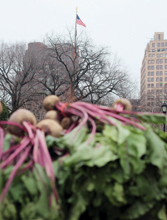
YEAR: 1971
EVENT: Alice Waters founds Chez Panisse in Berkeley, California, where she launches a revolution by rejecting flavorless commercial produce and starting to create her own network of local farmers and other suppliers. While not vegetarian in mission, she is credited as the creator of an alternative food supply that inspires the improvement of the quality, purity, and flavor of vegetables served in the United States, which encourages more chefs to cook with them and more diners to order them.
“During my years at Chez Panisse, Alice Waters had vegetable dishes that tasted so good, but they never had to shout that they were ‘vegetarian’ dishes. You’d see a dish of pizza with nettles and an egg on the menu, and you wouldn’t be thinking, ‘Oh, that’s vegetarian’—you’d be thinking, ‘Oh, that sounds delicious!’ Zuni Café was like that, too. I think that approach was really important.”
—DEBORAH MADISON, FOUNDING CHEF OF GREENS RESTAURANT
YEAR: 1971–1976
EVENT: During Earl Butz’s tenure as Secretary of Agriculture, he implements many broad-based changes to U.S. agricultural policy. Small farmers are told to “get big, or get out,” and many family-run farms go under. Subsidies are instead given to big agriculture, which—aided by new chemical-based fertilizers and technology—has larger-than-ever harvests and produces an unprecedented supply of food. While Americans’ food costs as a percentage of their income fall over the next three decades, healthcare costs rise in similar proportion.
“When I wrote Diet for a Small Planet in 1971, I could never have imagined that four decades on, we’d still face massive hunger, despite enough food for all and 40 percent more produced per person than when I wrote that book!… Since SOFI 12’s [State of Food Insecurity in the World 2012’s] release last fall, the FAO [Food and Agriculture Organization of the United Nations] has continued to develop its measures and updated its online Food Security Indicators. It now encourages us to see hunger as a range, from the chronic and severely undernourished 868 million to a larger number the FAO calls ‘food inadequate,’ which climbs as high as 1.3 billion people [out of a total global population estimated at 6.974 billion].”
—FRANCES MOORE LAPPÉ, IN A Q&A WITH HER DAUGHTER ANNA LAPPÉ ON HUFFINGTONPOST.COM (JULY 16, 2013)
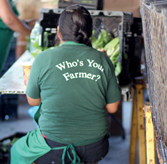
“All we had to do was find someone to eat this avalanche of cheap, low-quality food. In just two generations, a nation wracked by hunger ate its way into obesity, diabetes, and all sorts of other problems.”
YEAR: 1972
EVENT: Alice Laden, housekeeper and cook to 1925 Nobelist and long-time ethical vegetarian George Bernard Shaw (1856–1950), co-authors The George Bernard Shaw Vegetarian Cookbook with R. J. Minney, featuring dishes such as lentil curry and savory rice.
YEAR: 1972
EVENT: On May 12, UCLA graduate film student Anna Thomas’s book Vegetarian Epicure is published by Knopf, followed by Vegetarian Epicure–Book Two six years later. The two books are translated into multiple languages and sell millions of copies.
YEAR: 1972
EVENT: The feminist collective (and mostly if not entirely vegetarian) restaurant Mother Courage is opened by Dolores Alexander and Jill Ward in New York City’s Greenwich Village.
“I remember reading Anna Thomas’s Vegetarian Epicure, and being very taken with how well-traveled she was and how well she conveyed the sensuality of food. It balanced the compelling politics of Frankie [Frances Moore Lappé]’s Diet for a Small Planet.”
—AUTHOR MOLLIE KATZEN
“We visited Mother Courage restaurant many, many times in the 1970s. When we asked them for help with our plans to open Bloodroot, they opened their books and were enormously helpful to us.”
—SELMA MIRIAM, FOUNDER OF BLOODROOT (BRIDGEPORT, CT)
YEAR: 1973
EVENT: The Moosewood Collective—a restaurant co-founded by Mollie Katzen and others—opens in January in Ithaca, New York, and specializes in healthful natural foods cuisine. It commits to a vegetarian menu the following year. Through its continuous operation for more than four decades and the publication of a dozen cookbooks, it becomes a driving force in creative vegetarian cuisine and is eventually named by Bon Appétit as “one of the 13 most influential restaurants of the 20th century.” In 1977, The Moosewood Cookbook by Mollie Katzen is published, and it goes on to be cited by The New York Times as one of the ten bestselling cookbooks of all time, with more than two million copies sold. Multiple editions of Katzen’s book The Enchanted Broccoli Forest will cumulatively sell more than a million copies.
YEAR: 1973
EVENT: Deborah Santana (wife of musician Carlos Santana) and her sister Kitsaun open Dipti Nivas, one of the first vegetarian restaurants in San Francisco. Over the coming decade, it becomes renowned for its casseroles and veggie burgers at reasonable prices.
“One of the biggest influences on my cuisine was my obsession with international ethnic folk music. I’d visit music festivals as a hobby, as it offered a full cultural immersion in not only the folk music but the food of places like Greece, Turkey, the Balkans, and Israel. It’s how I first discovered tabbouleh, and how things like hummus became mainstream.… I had earned $2.25 an hour cooking at a vegetarian restaurant called the Shandygaff in San Francisco, so my brother and some friends recruited me to come back to Ithaca to help them put a restaurant together, and I ended up staying. When I wrote The Moosewood Cookbook, it was a homespun effort in every way. The original project was collated by hand; it was written in a very private voice for my siblings and cousins and something that I never imagined would become so very public.”
—MOLLIE KATZEN, CO-FOUNDER, THE MOOSEWOOD COLLECTIVE
“Aside from Tofu Cookery (1983), my very first cookbooks were all Mollie Katzen cookbooks, like Moosewood and Enchanted Broccoli Forest. Those were the books that got me started.”
—ISA CHANDRA MOSKOWITZ, AUTHOR OF ISA DOES IT AND VEGANOMICON
YEAR: 1974
EVENT: The first issue of Vegetarian Times magazine is published by its founder and editor—twenty-three-year-old Chicago nurse Paul Barrett Obis, Jr.—who distributes it through health-food stores. By 1987, its paid circulation will grow to 133,000, and by its four-hundredth issue in January 2013, it will hit 315,000.
“The more I embodied vegetarianism, the more I realized that it was not merely diet. It became a spiritual/ethical/compassionate/political/health issue. In short, it became my lifestyle. I could no longer separate my vegetarianism from other aspects of my life.”
—ELLEN SUE SPIVACK, WRITING IN THE OCTOBER 1975 ISSUE OF VEGETARIAN TIMES
YEAR: 1975
EVENT: United Nations Secretary-General Kurt Waldheim is quoted in Vegetarian Voice as describing the food consumption of rich countries (which typically eat more meat than other countries) as one of the causes of global hunger.
YEAR: 1975
EVENT: Wishing to introduce Americans to the pleasures of tofu, William Shurtleff and Akiko Aoyagi write The Book of Tofu, which goes on to sell hundreds of thousands of copies. They follow with The Book of Miso and The Book of Tempeh.
YEAR: 1975
EVENT: The Farm, a long-lived (to this day!) spiritual community founded in 1971 in Summertown, Tennessee, comes out with The Farm Vegetarian Cookbook, which plays a key role in popularizing tempeh, soy-based foods, and a vegan diet.
YEAR: 1975
EVENT: Animal Liberation by Australian philosopher Peter Singer is published, giving birth to the modern animal rights movement through condemning factory farming and medical research.
YEAR: 1975
EVENT: A New York Times headline reports “Vegetarianism: Growing Way of Life, Especially Among the Young.”
YEAR: 1975
EVENT: The biannual World Vegetarian Congress is held in Maine, drawing 1,500 vegetarians from across the United States and around the globe.
YEAR: 1975
EVENT: The medical journal Cancer Research publishes a study by Professor Kenneth K. Carroll summarizing other studies in multiple countries, all demonstrating that higher animal fat (but not plant fat) intake is correlated with increased breast cancer mortality.
“If I have to pick the book that had the most impact on me, I would say Peter Singer’s Animal Liberation, since I instantly became a vegetarian after reading it.”
—JANE GOODALL, WRITING IN NEW SCIENTIST (APRIL 16, 2008)
YEAR: 1976
EVENT: Laurel’s Kitchen by Laurel Robertson, Carol Flinders, and Bronwen Godfrey is published. It goes on to sell more than one million copies and is considered one of the first classic American vegetarian cookbooks of this era.
“One of the many popular vegetarian cookbooks, Laurel’s Kitchen (1976), written by disciples of Eknath Easwaran [an Indian spiritual teacher influenced by Gandhi], warned against ‘speedy refueling.’ ”
—FROM THE TEN-VOLUME SOCIAL HISTORY OF THE UNITED STATES (2009)
YEAR: 1976
EVENT: Cornell Class of 1971 graduate Julie Jordan comes out with her first cookbook Wings of Life: Vegetarian Cookery (later to be followed by 1986’s Cabbagetown Café Cookbook, and 1998’s A Taste of Julie Jordan). From 1977 through 1991, she owns vegetarian Cabbagetown Café in Ithaca, New York, which is known for its cashew chili, enchilada del dia, and fresh-baked bread. After the café closes in 1993, its signature salad of greens, chickpeas, broccoli, brown rice, herbed tofu, olives, nuts, and cheeses lives on at Wegmans, where Jordan today oversees the development of the Northeast supermarket chain’s meatless prepared dishes.
“Julie Jordan’s Wings of Life cookbook was our bible at the very beginning.… It was unsophisticated, but honest, and the recipes were for simple food with integrity and flavor.”
—SELMA MIRIAM, FOUNDER OF BLOODROOT (BRIDGEPORT, CT)
YEAR: 1976
EVENT: The organic vegetarian/vegan restaurant Angelica Kitchen opens in New York City. In 2000 its former executive chef (1992–1999) Peter Berley will come out with The Modern Vegetarian Kitchen. In 2003, then-owner Leslie McEachern will come out with The Angelica Home Kitchen, with recipes for signature dishes such as the Dragon Bowl.

YEAR: 1977
EVENT: The U.S. Senate Select Committee on Nutrition, chaired by Senator George McGovern, recommends decreasing consumption of saturated fat and cholesterol while increasing that of fruits, vegetables, and whole-grain cereals. The “McGovern report” causes an uproar in the meat, egg, and dairy industries.
“[Senator George] McGovern later told me that he took more pride in this work than in anything he had ever done, even if it had cost him and some of his colleagues in the Midwestern states their political careers. This was one of my first deeply troubling experiences with the politics of science.”
—T. COLIN CAMPBELL, AUTHOR OF THE CHINA STUDY
YEAR: 1977
EVENT: Bloodroot, a feminist collective vegetarian restaurant, is founded in Bridgeport, Connecticut. Two of the original collective members, Selma Miriam and Noel Furie, continue with the restaurant over three decades, writing two cookbooks (one vegetarian, one vegan).
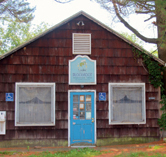
YEAR: 1977
EVENT: The Natural Gourmet Institute (NGI) is founded in New York City by Dr. Annemarie Colbin on the principle that “what we eat significantly affects our physical, mental, and spiritual well-being.” While not vegetarian in mission, the institute hosts popular weekly Friday night vegetarian dinners showcasing its students’ cooking and produces many influential vegetarian chefs, including Amanda Cohen of Dirt Candy, Tal Ronnen of Crossroads, and vegan cookbook author Bryant Terry.
YEAR: 1977
EVENT: With a huge peach surplus, California legislation prohibiting farmers from selling their produce outside commercial markets leaves tons of peaches to rot. Angry farmers dump them on the lawn of the State Capitol, leading Governor Jerry Brown to finally relax restrictions and allow farmers to sell produce at farmers’ markets, which spurs their proliferation. By 1979, the farmers’ market in Gardena becomes the first to open in southern California, and one of the first few in the state. By 2005, there will be nearly five hundred farmers’ markets in California, and by 2009, five thousand farmers’ markets in the United States. As of 2013, there are 8,144, according to the USDA.

“I moved to New Mexico [in the 1990s] to open a restaurant, but there were some delays, so when one day I overheard someone say he needed help at the Santa Fe Farmers Market, I said, ‘I have some time.’ The next week, I was manager of the market. And it was the best thing I ever did—I met the most wonderful growers.… It’s not easy to grow fruit in this climate—some years we have it, many years we don’t—so it was mostly vegetables. Santa Fe has always been known for its chiles, but there’s much more than chiles in the market. Today, we have heirloom corn that is ground for the most wonderful cornmeal, and by late July we have everything.”
—DEBORAH MADISON, AUTHOR, VEGETARIAN COOKING FOR EVERYONE
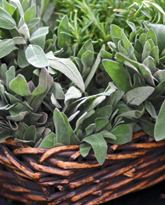
YEAR: 1977
EVENT: On October 1, the first World Vegetarian Day is held by the North American Vegetarian Society, becoming an annual tradition to kick off October as Vegetarian Awareness Month, which continues to this day. The following year, the International Vegetarian Union endorses October 1 as World Vegetarian Day.
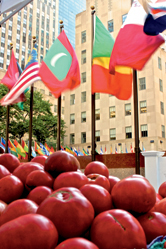
YEAR: 1977
EVENT: The American Journal of Clinical Nutrition reports on a study of 24,000 Seventh-day Adventists, indicating that males aged 35 to 64 eating a plant-based diet had three times less risk of heart disease than nonvegetarians in that demographic.
YEAR: 1978
EVENT: When The Inn at Little Washington opens in Washington, Virginia—70 miles outside Washington, DC—few suppliers are willing to make deliveries. Chef-owner Patrick O’Connell sources produce from dozens of local farmers instead, and by January 2011 the restaurant’s success will allow him to hire the Inn’s own farmer-in-residence to grow specialty produce ranging from haricots verts to microgreens to sweet peas on the Inn’s property to supplement that provided by more than 100 different suppliers, which are spotlighted on the Inn’s vegetarian tasting menu, arguably America’s finest.
YEAR: 1979
EVENT: Greens Restaurant opens in San Francisco under the auspices of the San Francisco Zen Center, becoming America’s first vegetarian fine dining restaurant under founding chef Deborah Madison. It showcases elegant preparations of produce from the Zen Center’s organic Green Gulch Farm in Marin. In 1981, Annie Somerville is hired to assist Madison; she will take over as chef when Madison departs in 1983.
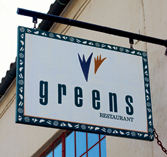
YEAR: 1979
EVENT: The Vegetarian Feast by Martha Rose Shulman is published, going on to win the Tastemaker Award in the Health and Special Diets category.
YEAR: 1979
EVENT: The Vegetarians by Rynn Berry (1945–2014)—which is based on interviews with famous vegetarians such as actors Marty Feldman, Cloris Leachman, and Dennis Weaver, and Nobel Prize–winning author Isaac Bashevis Singer—is published. Berry goes on to author or co-author other vegetarian books, including 1996’s Famous Vegetarians and Their Favorite Recipes: Lives and Lore from Buddha to the Beatles; 1998’s Food for the Gods: Vegetarianism & the World’s Religions; 2004’s Hitler: Neither Vegetarian Nor Animal Lover; and the annual Vegan Guide to New York City.
YEAR: 1980
EVENT: Influenced in part by Peter Singer’s book Animal Liberation, Ingrid Newkirk, with established animal rights activist Alex Pacheco, co-founds People for the Ethical Treatment of Animals (PETA), which organizes animal rights awareness campaigns.
YEAR: 1980
EVENT: The U.S. Departments of Health, Education and Welfare (now HHS) and Agriculture (USDA) jointly issue seven principles for a healthful diet, in response to the public’s demand for guidelines on diet and health. The principles become the first edition of Nutrition and Your Health: Dietary Guidelines for Americans. They will be revisited every five years to reflect the latest scientific research, although they remain remarkably consistent.
YEAR: 1981
EVENT: Madhur Jaffrey’s World-of-the-East Vegetarian Cooking is published, which goes on to win a James Beard Book Award in the category of Natural Foods/Special Diet.
YEAR: 1981
EVENT: In their report “The Causes of Cancer: Quantitative Estimates of Avoidable Risks of Cancer in the United States Today,” published by the Journal of the National Cancer Institute, Sir Richard Doll and Sir Richard Peto estimate that 35 percent of human cancers (with a “range of acceptable estimates” of 10–70 percent) may be attributed to diet. The results are summarized for the U.S. Congress.
YEAR: 1981
EVENT: Studies published in the journals Cancer and Lancet show that lung cancer among 14,000 smokers is substantially lower among those consuming beta-carotene-containing vegetables. These studies suggest that increased consumption of plant-based foods may reduce cancer risk.
“Whereas earlier thinking [e.g., Doll and Peto’s 1981 landmark report] about nutrition and cancer emphasized the adverse effects of fat and other components in the diet, the most compelling evidence of the last decade has indicated the importance of protective factors, largely unidentified, in fruits and vegetables.”
—DR. WALTER C. WILLETT OF HARVARD SCHOOL OF PUBLIC HEALTH, IN “DIET, NUTRITION, AND AVOIDABLE CANCER” (1995)
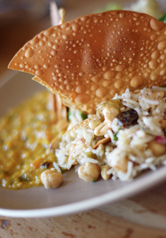
“If, through some miracle, I decided to resort to a vegetable diet forever, this new book by Madhur Jaffrey, who is to my mind the finest authority on Indian cooking in America, would be my Bible. It is by far the most comprehensive, fascinating, and inspired book on vegetable cookery that I have encountered.”
—CRAIG CLAIBORNE, WRITING OF MADHUR JAFFREY’S WORLD-OF-THE-EAST VEGETARIAN COOKING IN HIS MEMOIR A FEAST MADE FOR LAUGHTER
YEAR: 1982
EVENT: The National Research Council releases its Diet, Nutrition, and Cancer Report, the first major report connecting diet, nutrition, and cancer. Its major recommendations include reducing the consumption of fats and increasing the consumption of fruits, vegetables, and whole-grain cereal products.
YEAR: 1982
EVENT: Charles Stahler and Debra Wasserman establish the organization Baltimore Vegetarians. By 1990, it evolves into the Vegetarian Resource Group, reflecting the national demand for its research reports. The group publishes the Vegetarian Journal and a number of books, including 1991’s Simply Vegan, which sells more than 50,000 copies, and 1997’s Conveniently Vegan.
YEAR: 1982
EVENT: Actor William Shatner narrates The Vegetarian World, a thirty-minute documentary on vegetarianism, produced by Jonathon Kay. Even if Shatner’s jogging suit seems quaintly passé, its major points are relevant to this day.
YEAR: 1982
EVENT: The New York Times publishes Marian Burros’s article “In Defense of Vegetarianism: Seven Yeas,” based on conversations with seven well-known vegetarians, including actors Marty Feldman, Carol Kane, and Dennis Weaver. She writes, “Being a vegetarian in a largely carnivorous society has often meant second-class gastronomic citizenship.… But the situation has improved significantly in the last few years, say a number of well-known people who attempt to follow one version or another of a vegetarian diet. The improvement results, in part at least, from the increase in the number of people who call themselves vegetarians. There are now too many of them to be ignored. The Vegetarian Information Service, a nonprofit educational organization, puts the figure in this country at between seven and 12 million.”
YEAR: 1983
EVENT: Nikki and David Goldbeck’s American Wholefoods Cuisine: 1,300 Meatless Wholesome Recipes, from Short Order to Gourmet is published, leading Newsday to characterize it as “the vegetarian Joy of Cooking” and Vegetarian Times as “a monumental work.” It will be reissued in 2005.
YEAR: 1983
EVENT: In her New York Times article “New Research on the Vegetarian Diet,” Jane Brody argues that “the main question has become whether it is healthier to be a vegetarian than to be a meat eater,” which her column answers in the affirmative.
“On the whole, vegetarians are less likely to be afflicted with the chronic diseases that are leading killers and cripplers in societies where meat is the centerpiece of the diet.… To glean the heart-saving benefits of vegetarianism, consumption of such foods as hard cheese, cream cheese, ice cream, and eggs should be moderate.”
—JANE BRODY, THE NEW YORK TIMES (OCTOBER 12, 1983)
YEAR: 1983
EVENT: The March issue of Vegetarian Times contains an interview with Nobel Prize–winning author and vegetarian Isaac Bashevis Singer (1904–1991), who is quoted as saying, “Vegetarianism for me is a protest… protesting against everything which is not just: about the fact that there is so much sickness, so much death, so much cruelty. My vegetarianism is my religion, and it’s part of my protest against the conduct of the world.”
YEAR: 1983
EVENT: Customer requests for the hearty soup recipes served at the popular Los Angeles vegetarian restaurant lead to the publication of Follow Your Heart’s Vegetarian Soup Cookbook by Janice Cook Migliaccio. Co-owner Bob Goldberg recalls, “We serve three to five soups every day, including one dairy soup and one no-salt/no-oil soup, and have historically given out samples of each so customers could decide which to order. People loved them so much that they’d ask for the recipes, so it was a no-brainer to decide to do a cookbook. Of course, those recipes feature more butter and dairy than we use today.”
YEAR: 1983
EVENT: Physician John A. McDougall writes The McDougall Plan, which embraces a starch-based diet (e.g., beans, bread, corn, lentils, pasta, potatoes, rice) incorporating vegetables and fruits and eschewing animal-based foods and added oils. It is the first book by a Western doctor suggesting that food combining to make “complete proteins” is unnecessary, debunking a myth that is still widespread. He goes on to write another dozen health-related books, which collectively sell more than a million copies.
“All large populations of trim, healthy people, throughout verifiable human history, have obtained the bulk of their calories from starch. Examples of once thriving people include Japanese, Chinese, and other Asians eating sweet potatoes, buckwheat, and/or rice; Incas in South America eating potatoes; Mayans and Aztecs in Central America eating corn; and Egyptians in the Middle East eating wheat.”
—DR. JOHN A. MCDOUGALL, IN HIS NEWSLETTER (FEBRUARY 2009)
YEAR: 1983
EVENT: Marshall “Mickey” Hornick and his partner (and, later, wife) “Chef Jo” Kaucher open The Chicago Diner in Chicago, which serves meatless versions of diner classics. Just after the restaurant’s 20th anniversary, they release The Chicago Diner Cookbook, and on the restaurant’s 30th anniversary in 2013, The New Chicago Diner Cookbook.
YEAR: 1983
EVENT: Chef Michel Bras cooks his first vegetable menu at restaurant Bras in Laguiole, France, and will earn his third Michelin star in 1999. His signature dish gargouillou [pronounced gar-goo-yoo]—gorgeous composed salads featuring dozens of seasonal young vegetables, herbs, leaves, and seeds—will inspire versions by other chefs around the world in the decades to come.
“Vegetables are my life.… Vegetables are much more generous and luxurious than any protein from an animal.… [They] are the portal to the treatment of all other foods.”
—CHEF MICHEL BRAS, AS QUOTED ON GRUBSTREET.COM IN 2011
YEAR: 1983
EVENT: Soy foods pioneer Louise Hagler’s book Tofu Cookery is published.
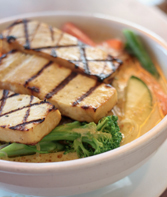
“Louise Hagler’s 1983 book Tofu Cookery is one of the books that changed my life. After my mom brought it home, she and my sister and I—who all went vegetarian together—started cooking and eating from it, almost every day it seemed. As we’d never shopped or cooked together before, it was the cookbook that brought everyone together. For the time, it had cutting-edge food photography, and everything looked great. I still make the brownies and the barbecue tofu—I even make the tofu balls, which are flavored with peanut butter and soy sauce, every week.”
—ISA CHANDRA MOSKOWITZ, AUTHOR OF ISA DOES IT AND VEGANOMICON
YEAR: 1984
EVENT: Bart Potenza purchases Sunny’s, a health food store and juice bar on Manhattan’s Upper East Side, and renames it the Healthy Candle in tribute to the prior owners’ nightly lighting of candles as a blessing. Over time, it evolves into a full-service vegetarian café.
YEAR: 1984
EVENT: Chef Raymond Blanc opens Le Manoir aux Quat’Saisons in Oxfordshire, England, where he offers a vegetarian menu option. The restaurant goes on to earn two Michelin stars.
“Now, more than ever, eating less meat and more vegetables represents a step toward a healthier lifestyle. This is the future of food.”
—CHEF RAYMOND BLANC
YEAR: 1985
EVENT: Dr. Neal Barnard founds the Washington, DC–based nonprofit Physicians Committee for Responsible Medicine (PCRM), which grows into a nationwide group of physicians and other supporters that promotes preventive medicine and addresses controversies in contemporary medicine, including efforts to reform federal dietary guidelines.
YEAR: 1985
EVENT: Classic Indian Vegetarian and Grain Cooking by Julie Sahni is published. It goes on to win the Glenfiddich Best Cookbook Award.
YEAR: 1986
EVENT: Gene Baur and his then-wife Lorri Houston found Farm Sanctuary in Watkins Glen, New York, which gives rescued factory-farmed animals a place to live. The Sanctuary will expand to 175 acres in upstate New York and 300 acres in northern California.
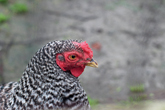
“For people who say that animals don’t deserve better, I would say that what we do to animals says perhaps more about us than it says about animals.”
—GENE BAUR, IN A TIME MAGAZINE INTERVIEW (MAY 27, 2011)
YEAR: 1986
EVENT: Nutritionist Marion Nestle moves to Washington, DC, to serve as editor of the Surgeon General’s Report on Nutrition and Health, a 700-page book released in the summer of 1988. She later reveals that she was told on her first day not to recommend eating less meat or less of any other food category.
“In the industry-friendly climate of the Reagan administration [1981–1989], the producers of foods that might be affected by such advice would complain to their beneficiaries in Congress, and the report would never be published. This scenario was no paranoid fantasy; federal health officials had endured a decade of almost constant congressional interference with their dietary recommendations.”
—MARION NESTLE, IN FOOD POLITICS
YEAR: 1986
EVENT: Community Supported Agriculture (CSA), which got its start in Germany, Japan, and Switzerland, takes root in the United States. Its growth takes off, leading to CSAs in every state, with more than 12,500 farms participating in CSAs by 2007.
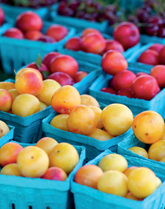
YEAR: 1987
EVENT: Yamuna Devi, who had received world-class culinary training from Srila Prabhupada, writes the classic cookbook Lord Krishna’s Cuisine: The Art of Indian Vegetarian Cooking. It becomes the first vegetarian cookbook to win the prestigious International Association of Culinary Professionals (IACP) Cookbook Award.
YEAR: 1987
EVENT: Diet for a New America by John Robbins (son of a founder of the ice cream chain Baskin-Robbins) is published, spotlighting the moral, economic, and emotional price we pay for the food we eat—and championing vegetarianism and even veganism as a cure for world hunger and the environment. The book becomes an instant classic, and Robbins continues to be an influential voice with books such as 1992’s May All Be Fed: Diet for a New World and 2001’s The Food Revolution, as well as at FoodRevolution.org.
YEAR: 1987
EVENT: The International Congress on Vegetarian Nutrition convenes in Washington, DC, with more than four hundred nutritional experts and researchers in attendance. It reconvenes every five years, and starting in 1997 it takes residence at Loma Linda University in southern California, its current home.
YEAR: 1987
EVENT: Deborah Madison, with Edward Espé Brown, writes The Greens Cookbook: Extraordinary Vegetarian Cuisine from the Celebrated Restaurant, which becomes a bestselling classic.
“Edward [Espé Brown] had written the Tassajara Bread Book, and [when I wanted to write my first book] the New York publishing community asked ‘Who’s Deborah Madison?’ I couldn’t get a book deal unless Edward’s name was on it, too. So we co-authored The Greens Cookbook.… I caught up with him a few years back during a visit to Larkspur. He made biscuits, and I was so impressed to see his hands and how they worked the dough, and how very delicious the biscuits were.”
—DEBORAH MADISON, FOUNDING CHEF OF GREENS RESTAURANT
YEAR: 1989
EVENT: Linda McCartney’s Home Cooking is published, celebrating a vegetarian lifestyle shared with former Beatle Paul McCartney. Two years later, she founds her own line of vegetarian foods. After Linda’s untimely death in 1998, McCartney will take up the vegetarian cause in earnest.
“If slaughterhouses had glass walls, everyone would be a vegetarian.”
—PAUL MCCARTNEY, IN THE VIDEO HE NARRATES AT MEAT.ORG
YEAR: 1989
EVENT: In September, Connoisseur magazine names the ten best restaurants in the world, noting that one of them—Alain Ducasse’s Le Louis XV in Monte Carlo, Monaco—features a vegetarian tasting menu.

YEAR: 1989
EVENT: At a meeting of the American Heart Association in New Orleans, the director of Sausalito, California’s Preventative Medicine Research Institute, Dr. Dean Ornish, presents the findings of his groundbreaking study of the effects of a vegetarian diet and lifestyle modifications on preventing and even reversing heart disease. He writes several national bestsellers, including 1990’s Dr. Dean Ornish’s Program for Reversing Heart Disease; 1993’s Eat More, Weigh Less; and 2007’s The Spectrum.
“Life-Style Shift Can Unclog Ailing Arteries, Study Finds… [Dr. Dean Ornish’s] study showed that a vegetarian diet, moderate exercise, and an hour a day of yoga and meditation could produce a reversal of atherosclerosis, a blockage of the arteries that can lead to a heart attack, in men and women who were strict in following the daily regimen. Experts say this is the first study to show that such blockage can be reversed without using cholesterol-lowering drugs or surgery.”
—DANIEL GOLEMAN, THE NEW YORK TIMES (NOVEMBER 14, 1989)
YEAR: 1980s
EVENT: A severe hailstorm wipes out the Ohio family farm of Bob Jones, Sr., and his sons Lee Jones and Bob Jones, Jr. Celebrated chef Jean-Louis Palladin’s request for squash blossoms grown organically leads to the family’s radical decision to focus on chefs’ needs for the highest quality, most flavorful produce as part of their rebuilding strategy. The result is The Chef’s Garden, which today supplies some of the best chefs in America with specialty produce such as microgreens, micro herbs, heirloom vegetables, specialty lettuces, and edible flowers. Their nonprofit Veggie U supplies classroom garden kits and a five-week science program that has been taught in 4,700 elementary and special needs classes across thirty-two states and Washington, DC.
“The quality of the produce that The Chef’s Garden delivers is absolutely unbelievable. They’re always turning us on to something special.… Farmer Lee Jones has been predicting that vegetables would become ‘the next center of the plate item’ for years.”
—CHEF MARK LEVY, THE POINT (SARANAC LAKE, NY)
YEAR: 1990
EVENT: T. Colin Campbell first announces the results of the China-Cornell Study, a groundbreaking work confirming the benefits of a plant-based diet. Jane Brody’s May 8 New York Times article on the study is titled “Huge Study of Diet Indicts Fat and Meat.”
“Early findings from the most comprehensive large study ever undertaken of the relationship between diet and the risk of developing disease are challenging much of American dietary dogma. The study, being conducted in China, paints a bold portrait of a plant-based eating plan that is more likely to promote health than disease. The study can be considered the Grand Prix of epidemiology.”
—JANE BRODY, THE NEW YORK TIMES (MAY 8, 1990)
YEAR: 1990
EVENT: The Savory Way, an illustrated vegetarian cookbook by former Greens Restaurant chef Deborah Madison, wins the IACP’s Cookbook of the Year Award.
YEAR: 1990
EVENT: Sundays at Moosewood Restaurant by the Moosewood Collective is published.
YEAR: 1990
EVENT: Classically trained French chef Jean-Georges Vongerichten, then of the four-star restaurant Lafayette in New York City, comes out with his groundbreaking and influential cookbook Simple Cuisine, which eschews the use of meat stocks in favor of lighter vinaigrettes, flavored oils, and vegetable juices and broths.
YEAR: 1990–1991
EVENT: Drafts of the U.S. Department of Agriculture’s proposed Food Pyramid are reviewed.
YEAR: 1991
EVENT: On January 13, Chicago chef Charlie Trotter prepares a seven-course all-potato menu at the James Beard House in New York City, which is thought to be the first meatless (and likely the first vegetarian) meal ever served there. Some of the dishes include a terrine of potato and sauerkraut with chèvre cream, new potato and sweetcorn risotto with corn consommé and crispy sweet potatoes, and potato-black truffle ice cream.
“We do a vegetable degustation menu at the restaurant that now accounts for about 20 percent of our orders.… Many of the dishes we served on the potato menu were originally on the vegetable menu.”
—CHARLIE TROTTER, AS QUOTED IN NATION’S RESTAURANT NEWS (FEBRUARY 25, 1991)
YEAR: 1991
EVENT: Dr. Caldwell Esselstyn, Jr., of the Cleveland Clinic presents his ground-breaking five-year longitudinal study of dramatically reduced advanced heart disease among eighteen seriously ill patients consuming a diet free of animal-based foods and added oils, at the first National Conference for the Elimination of Coronary Heart Disease, in Tucson.
YEAR: 1991
EVENT: On April 8, The Physicians Committee for Responsible Medicine (PCRM) proposes replacing the USDA’s long-time (since 1956) four food groups (meat, milk, fruits/vegetables, and breads/cereals) with their New Four Food Groups—whole grains, vegetables, legumes, and fruits—based on decades of peer-reviewed studies establishing the value of a plant-based diet.
YEAR: 1991
EVENT: On April 27, the U.S. Department of Agriculture (USDA) withdraws its proposed Eating Right Pyramid Food Guide under pressure from the meat and dairy industries, bringing to light the conflict of interest of its dual mandates to promote agriculture and to inform the public on nutrition.
“This [April 27] incident also highlights the inherent conflict of interest in the Department of Agriculture’s dual mandates to promote U.S. agricultural products and to advise the public about healthy food choices.”
—MARION NESTLE, VIA AN ABSTRACT OF HER ARTICLE “FOOD LOBBIES, THE FOOD PYRAMID, AND U.S. NUTRITION POLICY” IN THE INTERNATIONAL JOURNAL OF HEALTH SERVICES (1993)
YEAR: 1991
EVENT: Zen Palate, a hip vegetarian restaurant, opens in Manhattan’s theater district. Years later, it will be described as “the granddaddy of Pan-Asian vegetarian restaurants in New York City.”
“Zen Palate is a rare and oddball treasure, a special taste—somewhere between loving Tom Waits’ singing and eating rose petals for breakfast. And yet everyone I’ve taken there has seemed enchanted.… The food is eclectic, too, quite Chinese and a little Japanese with a hint of Indonesia, hometown healthful meets nouvelle cuisine.”
—GAEL GREENE, IN HER MAY 28, 1991, NEW YORK MAGAZINE REVIEW, WHICH SHE RECALLS IN 2013 AS THE ONLY VEGETARIAN RESTAURANT SHE EVER REVIEWED IN MORE THAN FOUR DECADES AS A RESTAURANT CRITIC

YEAR: 1991
EVENT: The Now and Zen Epicure: Gourmet Vegan Recipes for the Enlightened Palate by San Francisco’s Now and Zen Bakery founder Miyoko Nishimoto (later Schinner) is published. She will follow it with 1999’s vegetarian Japanese Cooking, as well as 2012’s bestselling Artisanal Vegan Cheese, which spurs home cooks and professional chefs alike to experiment with vegan cheese-making.
YEAR: 1991
EVENT: Friendly Foods by Brother Ron Pickarski, a Franciscan monk, is published, focusing on whole grains, vegetables, legumes, sea vegetables, and various other so-called “friendly” foods that “do not bear the high environmental, economic, and nutritional costs of meat and processed foods.”
YEAR: 1991
EVENT: The National Restaurant Association (NRA) commissions its first survey on meatless menu options, with “astounding” results. Twenty percent of American adults responded that they were “likely or very likely” to choose a restaurant with vegetarian options, based on health concerns and taste preferences.
YEAR: 1992
EVENT: As interest in classic French restaurants slows, Hubert Keller’s renowned restaurant Fleur de Lys in San Francisco replaces butter and cream with vegetable stocks and purees and offers a five-course vegetarian tasting menu. Cardiologist Dr. Dean Ornish taps Keller for recipes to include in his heart-healthy cookbook Eat More, Weigh Less.
YEAR: 1992
EVENT: In June, the U.S. Dept. of Agriculture introduces the Food Pyramid as the government’s primary food group symbol representing a nutritious diet.
YEAR: 1992
EVENT: Recipes from an Ecological Kitchen by Lorna Sass is published. It is later reissued as Lorna Sass’s Complete Vegetarian Kitchen, which Mollie Katzen characterizes as “the best vegan cookbook.”
YEAR: 1993
EVENT: Healthy Candle owner Bart Potenza and his nutritionist partner, Joy Pierson, play the lottery (using the numbers of both their birthdays) on Friday the 13th—winning $53,000. The proceeds are used to create Candle Cafe (1994) and, a decade later, Candle 79 (2003), considered two of the very best fine-dining vegan restaurants in America.
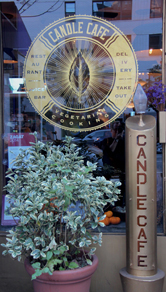
YEAR: 1993
EVENT: In June, Ann Gentry opens the organic, plant-based restaurant Real Food Daily in Santa Monica. Additional locations in West Hollywood and Pasadena will follow.
“Ann Gentry [has come up with] a cuisine that is as interesting and delicious as it is healthful.”
—BON APPÉTIT
YEAR: 1994
EVENT: On the heels of the success of its sister restaurant Milly’s in San Rafael, California, San Francisco’s Millennium opens as a fine-dining vegetarian restaurant under executive chef Eric Tucker. In 1998, Tucker co-authors The Millennium Cookbook and in 2003, The Artful Vegan.
YEAR: 1994
EVENT: Chef Tanya Petrovna opens Native Foods in Palm Springs, California. In November/December 2009, Vegetarian Times will describe it as “the vegan restaurant with a global consciousness” which “has expanded into eight locations in Southern California, with plans to grow a dozen more branches reaching beyond the Golden State.” In 2010, the vegan fast-casual chain will be acquired by a couple, Andrea McGinty and Daniel Dolan, who move the California company’s national headquarters to Chicago and forecast 2011 sales at its multiple locations to be $15 million. In 2013, the company will project having forty-five locations operating in both existing and new markets (e.g., Baltimore, Dallas, and Philadelphia) by the end of 2014, and two hundred locations by 2017.
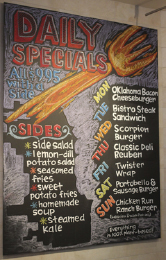
YEAR: 1994
EVENT: World Vegan Day’s first annual celebration is held on November 1, to mark the fiftieth anniversary of the Vegan Society.
YEAR: 1995
EVENT: The film Babe, starring twenty-year vegetarian James Cromwell, debuts. On the heels of the Oscar-nominated film’s success, Cromwell campaigns against animal cruelty toward pigs.
“Start with one meal a day, then up it to one day a week, then one week a month. Work your way into not consuming animals and animal products and inform yourself. It doesn’t take anything at all, and it’s very easy to do. Then you start to think, ‘What else?’ This process begins your consciousness.”
—VEGETARIAN ACTOR JAMES CROMWELL, WHO BECAME A VEGAN AFTER MAKING BABE
YEAR: 1996
EVENT: A fourth-generation dairy farmer and cattle rancher turned vegetarian and food-safety activist, Howard Lyman makes comments on The Oprah Winfrey Show that lead Oprah to publicly swear off hamburgers. The National Cattlemen’s Beef Association sues Lyman and Winfrey, although both are found not guilty of any wrongdoing in 1998. Lyman comes out with a 1998 book on dangerous practices of the cattle and dairy industries entitled Mad Cowboy: Plain Truth from the Cattle Rancher Who Won’t Eat Meat.
“I felt better knowing that there was one answer to many of the different ills afflicting both ourselves and our environment. Everything revolved around the fork.”
—HOWARD LYMAN, IN MAD COWBOY (1998)
YEAR: 1996
EVENT: Joseph Connelly launches the Syracuse Area Vegetarian Education Society and a twenty-eight-page newspaper tabloid. Four years later, he teams with Colleen Holland to turn it into a glossy, four-color magazine called VegNews.
YEAR: 1996
EVENT: Husband-and-wife vegetarians Jeff and Sabrina Nelson found VegSource.com, which celebrates vegetarianism. Within five years, it will be ranked the number-one food-oriented site on the web.
YEAR: 1996
EVENT: Two years after the publication of his eponymous first cookbook, Chicago chef Charlie Trotter comes out with his book Charlie Trotter’s Vegetables.
“I have always considered vegetable cookery the most interesting part of cuisine. Vegetables provide an incredible depth and complexity in both flavor and texture, not to mention an extraordinary range of colors and shapes.… I just happen to be in love with the experience of touching, cooking, and eating the multitude of vegetables, fruits, legumes, and grains. It is sincerely one of the most sensual joys of my life.”
—CHARLIE TROTTER, IN CHARLIE TROTTER’S VEGETABLES (1996)
YEAR: 1996
EVENT: Seven-year-old Ristorante Joia restaurant in Milan becomes the first vegetarian restaurant in Europe to win a Michelin star.
YEAR: 1997
EVENT: On May 23, Didi Emmons’s book Vegetarian Planet is published. It goes on to sell more than 200,000 copies.
YEAR: 1997
EVENT: Erik Marcus’s book Vegan: The New Ethics of Eating is published. Eleven years later, he will run the website Vegan.com.
YEAR: 1997
EVENT: Vegetarian Cooking for Everyone by Deborah Madison is published. The following year, it is named “Cookbook of the Year” by the International Association of Culinary Professionals (IACP) and wins the James Beard Book Award for Best Vegetarian Cookbook, becoming one of the year’s bestselling cookbooks.
YEAR: 1998
EVENT: In May, Vegetarian Times reports on the proliferation of vegetarian tasting menus at upscale restaurants across America. Restaurants cited as examples include Aquavit (NYC), Cascabel (NYC), Chanterelles (Philadelphia), Charlie Trotter’s (Chicago), Fleur de Lys (San Francisco), French Laundry (Yountville, CA), Jojo (NYC), La Grenouille (NYC), Lespinasse (NYC), Patina (Los Angeles), Restaurant DANIEL (NYC), Seeger’s (Atlanta), and Verbena (NYC).
“Now, vegetarians are not only accommodated but celebrated with a recent menu renovation called the vegetarian tasting.… [Chef Gray Kunz] says that over the last decade the growth of farmers markets in urban areas has made it easier and more appealing for chefs to work with seasonal vegetables.… ‘Meat is probably the most boring ingredient to work with,’ [chef Thomas Keller] says with some disdain, ‘but the possibilities are endless with vegetables.’ ”
—ALICE FEIRING, VEGETARIAN TIMES (MAY 1998)
YEAR: 1999
EVENT: Eric Brent launches HappyCow.com, a worldwide database of vegetarian restaurants, which lists about 1000. That number will increase to 5,500 by early 2014 for the United States alone.
YEAR: 2000
EVENT: For the first time in history, the world experiences a net loss in farmland. Acreage continues to fall annually, as the population continues to rise. Concerns about the logistical impossibility of feeding the world’s population if such rates continue lead to growing worries about global hunger.
YEAR: 2000
EVENT: In October, a court ruling determines that the USDA has violated federal law by withholding documents and hiding financial conflicts of interest. The USDA provides information showing financial conflicts of interest for six Dietary Guidelines Committee members (out of eleven, or the majority), who had financial ties to the food industry.
“Having advisors tied to the meat or dairy industries is as inappropriate as letting tobacco companies decide our standards for air quality.”
—DR. NEAL BARNARD, PRESIDENT, PHYSICIANS COMMITTEE FOR RESPONSIBLE MEDICINE, A NON-PROFIT GROUP THAT FILED A 1998 SUIT AGAINST THE USDA
YEAR: 2001
EVENT: Michelin three-star chef Alain Passard removes red meat and seafood from the menu of his Paris restaurant L’Arpège.
“Alain Passard… is now rightly considered a visionary by the best chefs in the world.”
—CHEF DAVID KINCH, IN MANRESA (2013)
YEAR: 2002
EVENT: On May 14 (the same day as the launch of his album 18), musician Moby (a vegan since 1986) opens the vegan café TeaNY in New York City with his partner, Kelly Tisdale.
YEAR: 2003
EVENT: The U.S. Centers for Disease Control and Prevention (CDC) reports that one in three children born in 2000 will develop type 2 diabetes during their lifetime, concluding that the increase in the incidence of diabetes is directly proportional to the increasing rates of obesity. The study also shows that diabetes significantly reduces life expectancy. For the first time in U.S. history, a generation has a shorter life expectancy than its parents’ generation.
YEAR: 2003
EVENT: The “Meatless Mondays” campaign is relaunched—this time, not as a war effort, but as a way to help people decrease meat and saturated fats in their diet by about 15 percent (or one-seventh). The effort, led by health advocate and retired ad executive Sid Lerner in conjunction with the Johns Hopkins Bloomberg School of Public Health’s Center for a Livable Future, creates awareness of the preventable illnesses associated with excessive consumption of meat. Within several years, it becomes a global campaign involving participants in twenty-three countries, led by Peggy Neu.
YEAR: 2003
EVENT: Dismayed by the lack of vegan cooking shows, 20-something vegetarians-since-sixteen Isa Chandra Moskowitz and Terry Hope Romero launch their own show, aired on community access television in Manhattan and Brooklyn, called “The Post-Punk Kitchen.” While working to start a vegan ’zine called Vegan with a Vengeance, Moskowitz gets offered a book deal that leads her to instead publish her recipes as her first book in 2005, and it goes on to sell more than 50,000 copies in its first two years. Moskowitz and Romero co-author several subsequent books, including 2006’s Vegan Cupcakes Take Over the World and 2007’s Veganomicon, and the two also go on to author other books separately.
“Punk taught me to question everything. Of course, in my case that means questioning how to make a Hostess cupcake without eggs, butter, or cream.”
—ISA CHANDRA MOSKOWITZ, AS QUOTED IN JULIA MOSKIN’S PROFILE OF HER IN THE NEW YORK TIMES, WHICH SHE COUNTS AS HER FIRST MAINSTREAM PRESS (JANUARY 24, 2007)
YEAR: 2003
EVENT: Candle 79 is founded in New York City; it will be considered the grande dame of upscale vegan restaurants.
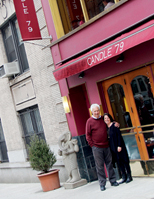
“I used to live near Seventy-ninth [Street] and Third [Avenue] in Manhattan, so I ate at Candle Cafe all the time. I loved their Cajun seitan sandwich. I also worked at Candle 79 in garde manger during its opening. While it took some of the kitchen staff a really long time to come in to work from Staten Island, I could literally walk the half-block to work in a minute and a half!”
—TAL RONNEN, CROSSROADS (LOS ANGELES)
YEAR: 2003
EVENT: Chicago chef Charlie Trotter and Larkspur, California, raw chef Roxanne Klein coauthor Raw, a coffee table-style book showcasing juiced, dehydrated, and blended fruits and vegetables.
YEAR: 2003
EVENT: The Chair of New York University’s Department of Nutrition, Food Studies, and Public Health Marion Nestle comes out with her groundbreaking book Food Politics: How the Food Industry Influences Nutrition and Health, which goes on to win a number of major book awards. She will later write 2003’s Safe Food and 2006’s What to Eat, and in 2013, Food Politics will be reissued in an updated 10th anniversary edition.
YEAR: 2003
EVENT: Dr. Joel Fuhrman’s Eat to Live: The Amazing Nutrient-Rich Program for Fast and Sustained Weight Loss is published, espousing the notion that health equals nutrients divided by calories—or nutrient density (later popularized by his ANDI ratings seen at Whole Foods)—and advocates a six-week vegetarian diet to kick off weight loss. The book becomes a New York Times number-one bestseller and goes on to sell more than a million copies.
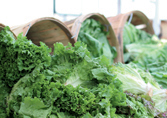
“Even physicians and dietitians… are surprised to learn that… when you eat large quantities of green vegetables, you receive a considerable amount of protein.”
—DR. JOEL FUHRMAN, IN HIS BOOK EAT TO LIVE
YEAR: 2004
EVENT: The American Medical Association reverses its negative stance on a vegan diet, citing many new scientific studies.
YEAR:2004
EVENT: Karen Iacobbo and Michael Iacobbo write the first complete history of vegetarianism in the United States, Vegetarian America: A History.
YEAR: 2004
EVENT: In March, Terces and Matthew Engelhart open their first organic, local, sustainable (and meat-free) Café Gratitude in San Francisco. Other locations will follow in the Bay Area as well as in Los Angeles (2011), as will their organic, vegan, non-GMO Mexican restaurant Gracias Madre in both San Francisco (2010) and Los Angeles (2014). Their daughter Mollie will open LA-based KindKreme (vegan ice cream) and Sage (vegan beer garden), and sons Ryland and Cary will produce the food documentary May I Be Frank?
“It’s amazing what expert spicing can do. Who would miss the lard or meat juices in the refried beans? The mash is so well seasoned you’d almost swear there was bacon somewhere in the blend.… However, the thing that even impressed my persnickety friend was the flan, which was as smooth and creamy as one made with milk and eggs.”
—MICHAEL BAUER, IN HIS TWO-STAR REVIEW OF GRACIAS MADRE IN THE SAN FRANCISCO CHRONICLE (JUNE 20, 2010)
YEAR: 2004
EVENT: Then-partners Matthew Kenney and Sarma Melngailis open Pure Food and Wine, New York City’s first raw vegan fine dining restaurant. In 2005, they co-author Raw Food / Real World: 100 Recipes to Get the Glow. Forbes will name Pure one of its “All Star New York Eateries,” and it will also appear on New York’s “Top 100 Restaurants” list.
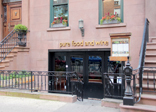
YEAR: 2004
EVENT: After heading the kitchens at Trio in Evanston and his own seafood-focused restaurant, Spring, in Chicago, chef Shawn McClain opens the upscale vegetarian restaurant Green Zebra in Chicago. In 2006, McClain will be named Best Chef: Midwest by the James Beard Foundation.
“This is more than vegetarian food. This is vegetarian food that puts a contented smile on the faces of confirmed carnivores.”
—PHIL VETTEL, IN HIS THREE-STAR REVIEW OF GREEN ZEBRA IN THE CHICAGO TRIBUNE (MAY 15, 2008)
YEAR: 2004
EVENT: Forbes magazine reports that vegetarian food sales have doubled since 1998, hitting $1.6 billion in 2003, with 61 percent growth forecasted by 2008.
YEAR: 2005
EVENT: Southern California-based Veggie Grill is founded by partners Kevin Boylan and T. K. Pillan. By 2014, the fast-casual vegetarian chain will have twenty-six locations in California, Oregon, and Washington State, with plans for continued expansion.
YEAR: 2005
EVENT: Cornell professor T. Colin Campbell and his son Thomas M. Campbell II’s book The China Study: The Most Comprehensive Study of Nutrition Ever Conducted and the Startling Implications for Diet, Weight Loss and Long-Term Health is published, and goes on to sell more than a million copies.
“I’ve been reading The China Study, and enjoying it enormously. Its widespread success is significant, because you can’t unknow something once you know it.”
—BOB GOLDBERG, FOLLOW YOUR HEART (CANOGA PARK, CA)
YEAR: 2005
EVENT: The new Dietary Guidelines mark the first time the USDA acknowledges that not everyone can digest dairy, with a comment about those who “don’t or can’t consume milk.”
“The Vegetarian Resource Group estimates that 2.8% of adult Americans consider themselves vegetarian, up from 2.3% in a 2000 survey. Another 6% to 10% of the population said it was ‘almost vegetarian’ and another 20% to 25% are ‘vegetarian inclined,’ or intentionally reducing meat in their diet, according to VRG.”
—FORBES (SEPTEMBER 15, 2004)
YEAR: 2005
EVENT: Dr. Walter Willett, chair of the Department of Nutrition at Harvard School of Public Health and author of Eat, Drink and Be Healthy, creates a score card to rank who benefits most from the 2005 Dietary Guidelines. “Big dairy” wins with a score of 10 points, “Big beef” comes in second with eight points, while the public’s health comes in third with six points.
YEAR: 2005
EVENT: In December, an irreverent vegan diet book co-authored by a former model and modeling agent is published. Skinny Bitch by Rory Freedman and Kim Barnouin sells more than 250,000 copies within two years. It goes on to be translated into multiple languages and, with more than three million copies in print, becomes the bestselling vegetarian diet book of all time.
YEAR: 2006
EVENT: The United Nations Food and Agriculture Organization (FAO) reports that livestock farming generates 18 percent of the Earth’s greenhouse gas emissions. In contrast, all the world’s transportation systems (boats, cars, planes, trains, etc.) total just 13 percent.
YEAR: 2006
EVENT: Sublime, a vegan restaurant opened in 2003 by animal rights activist Nanci Alexander, which earmarks 100 percent of its profits for animal welfare, reopens after hurricane damage and a hiatus in Ft. Lauderdale, Florida.
YEAR: 2006
EVENT: On the heels of Horizons Café (1994–2005), Rich Landau and Kate Jacoby open Horizons in Philadelphia, which gains many followers in its subsequent five-year run. Staff go on to open their own vegan spots in Philadelphia (e.g., 2010’s Blackbird Pizza and Sprig and Vine, 2012’s Hip City Veg and Miss Rachel’s Pantry).
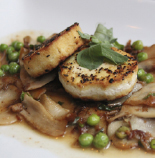
YEAR: 2007
EVENT: In an article titled “Got Beef? No, and They’re Doing Fine, Thank You,” the Associated Press reports that vegetarian restaurants are growing in number and in popularity, citing as examples Candle 79 (New York), Horizons (Philadelphia), and Sublime (Ft. Lauderdale).
“Once a network of grungy, obscure cafes, the vegetarian and vegan experience in some cities has blossomed on par with its carnivorous counterparts, complete with Zagat ratings and celebrity clienteles. There are between 1,000 and 1,200 vegetarian restaurants in the U.S., almost double the number seven years ago, according to Dennis Bayomi, president of VegDining.com, an online guide to vegetarian restaurants.”
—ASSOCIATED PRESS (APRIL 27, 2007)
YEAR: 2007
EVENT: Dr. Caldwell B. Esselstyn, Jr., comes out with his book Prevent and Reverse Heart Disease: The Revolutionary, Scientifically Proven, Nutrition-Based Cure, which advocates a strict vegetarian diet. It becomes a huge bestseller.
YEAR: 2007
EVENT: On September 28, comedian, political commentator, and talk-show host Bill Maher takes on pharmaceutical companies in his “New Rules” rant, concluding, “The answer isn’t another pill. The answer is spinach.”
“We won’t stop being sick until we stop making ourselves sick.… The government isn’t your nanny—they’re your dealer, and they subsidize illness in America. They have to. There’s too much money in it. You see, there’s no money in healthy people. And there’s no money in dead people. The money’s in the middle: people who are alive, sort of, but with one or more chronic conditions that put them in need of [prescription medications].… The answer isn’t another pill. The answer is spinach.”
—BILL MAHER (SEPTEMBER 28, 2007)
YEAR: 2007
EVENT: On the heels of the popularity of his bestselling book How to Cook Everything, author Mark Bittman comes out with How to Cook Everything Vegetarian. In 2013, he’ll fuel the part-time vegan trend with his book VB6: Eat Vegan Before 6:00 to Lose Weight and Restore Your Health… for Good.
YEAR: 2008
EVENT: Inspired by Kathy Freston’s new book Quantum Wellness: A Practical and Spiritual Guide to Health and Happiness, talk-show host Oprah Winfrey undertakes a three-week vegan cleanse. Her 21-Day Cleanse menu is created by chef Tal Ronnen.
YEAR: 2008
EVENT: Chef Amanda Cohen—who previously cooked at Pure Food and Wine and Moby’s vegetarian restaurant TeaNY—opens her restaurant Dirt Candy in New York City’s East Village. Four years later, it will win a rave two-star review from the New York Times—only the second vegetarian restaurant in history (after Candle 79) to do so. In 2012, Cohen will come out with her popular memoir-cum-comic-book-cum-cookbook: Dirt Candy: A Cookbook: Flavor-Forward Food from the Upstart New York City Vegetarian Restaurant, of which Pete Wells writes in the New York Times, “Humor is so integral to [Amanda] Cohen’s work that she may be the only chef in America who could publish her first cookbook in comic-book form and make the decision seem not just sensible but inevitable.”

“She likes cream and butter and deep-frying, and is big on drizzling and tall garnishes. Many of her dishes are so earnest in their embrace of a single ingredient that you find yourself stopping to really think about that vegetable, as if for the first time.”
—KATE JULIAN, THE NEW YORKER, ON DIRT CANDY CHEF-OWNER AMANDA COHEN (JANUARY 26, 2009)
YEAR: 2008
EVENT: In April, Vegetarian Times publishes its study “Vegetarianism in America,” which indicates that 7.3 million Americans are vegetarians and that an additional 22.8 million say they largely follow a vegetarian-inclined diet.
“The 2008 study also indicated that over half (53 percent) of current vegetarians eat a vegetarian diet to improve their overall health. Environmental concerns were cited by 47 percent; 39 percent cited ‘natural approaches to wellness’; 31 percent cited food-safety concerns; 54 percent cited animal welfare; 25 percent cited weight loss; and 24 percent weight maintenance.”
—VEGETARIAN TIMES (APRIL 2008)
YEAR: 2008
EVENT: On July 15, Napa Valley vegetarian restaurant Ubuntu’s chef Jeremy Fox and pastry chef Deanie Fox cook the first vegetarian dinner in nearly two decades at the James Beard House in New York City. The same year, Jeremy Fox is named one of Food & Wine magazine’s “Best New Chefs.”
“Wow. Sweet peas, tangy mint, crunchy macadamias and buttery white chocolate. Smooth coconut milk, floral Kaffir lime, peppery coriander and sugary watermelon. Creamy Anson Mills grits folded with a spinachy borage puree and a piquant nasturtium foam. Last night I got to eat some of the most exciting, delicious combinations I’ve tasted anywhere, let alone at the James Beard House… Jeremy Fox of Ubuntu in California’s Napa Valley, an F&W Best New Chef 2008 pretty much knocked our socks off. And then his wife—Ubuntu’s pastry chef, Deanie—knocked us all flat with her unbelievable vegan (vegan!) carrot cupcakes with teeny-tiny candied carrots on top.”
—EMILY KAISER OF FOOD & WINE, IN A BLOG POST TITLED “THE MOST EXCITING CHEFS IN AMERICA?” (JULY 16, 2008)
YEAR: 2008
EVENT: On July 17, director Mike Anderson releases his documentary Eating. Two years later, hotelier Steve Wynn watches it on his yacht and immediately goes vegan, buying 10,000 copies of the film to distribute to his employees before bringing in consulting chef Tal Ronnen to help add vegan options to every one of his Las Vegas restaurants (including steakhouses).
“I was kind of intimidated to be brought in to consult with some of the celebrated restaurants at Wynn, one of which had two Michelin stars. I told them right off the bat that I wasn’t there to teach them how to cook—just to show them a few tricks to help them accommodate their vegan diners, like substituting heavy cream with cashew cream, or butter with Earth Balance. It was definitely a collaborative process over two years to come up with vegan dishes that fit each restaurant’s menu, from Italian to seafood.”
—TAL RONNEN, CROSSROADS (LOS ANGELES)
YEAR: 2009
EVENT: In January, PETA names the Top 8 Vegetarian Restaurants in America as Candle 79 (NYC), Dragonfly Neo-V (Columbus, OH), Green Zebra (Chicago), Horizons (Philadelphia), Madeleine Bistro (LA), Millennium (San Francisco), Sublime (Ft. Lauderdale), and VegiTerranean (Akron, OH).
YEAR: 2009
EVENT: In February, Texas firefighter Rip Esselstyn’s book The Engine-2 Diet is published, which describes his putting his unit on a low-fat vegetarian diet, and how every single firefighter was inspired by the health benefits. The book becomes a New York Times bestseller.
YEAR: 2009
EVENT: Spearheaded by First Lady Michelle Obama, in March the White House breaks ground on the largest vegetable garden on its lawn in history, and the first since First Lady Eleanor Roosevelt’s victory garden during World War II. Its mission is educational: to teach children about the healthfulness of fresh, local fruits and vegetables and thereby intervene in the nation’s childhood obesity and diabetes crisis.
YEAR: 2009
EVENT: Jonathan Safran Foer’s Eating Animals is published, which vegetarian talk-show host Ellen DeGeneres describes as “one of the most important books I’ve ever read.”
“Ninety-nine percent of all land animals eaten or used to produce milk and eggs in the United States are factory farmed.… What happens to all of the male offspring of layers [chickens who lay eggs]?… They serve no function. Which is why all male layers—half of all the layer chickens born in the United States, more than 250 million chicks a year—are destroyed.”
—JONATHAN SAFRAN FOER, EATING ANIMALS (2009)
YEAR: 2009
EVENT: In July, the American Dietetic Association, known since 2012 as the Academy of Nutrition and Dietetics, issues its “Position on Vegetarianism,” which states, “It is the position of the American Dietetic Association that appropriately planned vegetarian diets, including total vegetarian or vegan diets, are healthful, nutritionally adequate, and may provide health benefits in the prevention and treatment of certain diseases.… The results of an evidence-based review showed that a vegetarian diet is associated with a lower risk of death from ischemic heart disease. Vegetarians also appear to have lower low-density lipoprotein cholesterol levels, lower blood pressure, and lower rates of hypertension and type 2 diabetes than nonvegetarians. Furthermore, vegetarians tend to have a lower body mass index and lower overall cancer rates. Features of a vegetarian diet that may reduce risk of chronic disease include lower intakes of saturated fat and cholesterol and higher intakes of fruits, vegetables, whole grains, nuts, soy products, fiber, and phytochemicals.”
“While a plant-based diet has been associated with many health benefits—including a smaller risk of death from heart disease, lower LDL cholesterol levels, and a reduced incidence of diabetes, obesity and cancer—the diet has to be ‘appropriately planned,’ as the American Dietetic Association said in its recent position statement on the subject.”
—KATHERINE HOBSON, U.S. NEWS & WORLD REPORT (AUGUST 4, 2009)
YEAR: 2009
EVENT: Actress, conservationist, and activist Alicia Silverstone comes out with The Kind Diet: A Simple Guide to Feeling Great, Losing Weight, and Saving the Planet, which advocates a vegan diet. It becomes an instant bestseller.
YEAR: 2009
EVENT: On November 3, chef Rich Landau and pastry chef Kate Jacoby (currently of Philadelphia’s Vedge) cook the first-ever vegan dinner at the James Beard House in New York City. The menu includes portobello carpaccio with squash bread pudding; fennel-cauliflower bisque; celery root ravioli with charred Brussels sprouts, royal trumpet mushrooms, and a sage-mustard emulsion; salt-roasted beets with peppercorn-crusted tofu; and heirloom pumpkin cheesecake with quince jam and candied chestnut.
YEAR: 2009
EVENT: On November 19, cooking-show host Martha Stewart hosts a “Vegetarian Thanksgiving Special,” with guests including Napa Valley vegetarian restaurant Ubuntu chef Jeremy Fox, Eating Animals author Jonathan Safran Foer, and Food, Inc. documentarian Robert Kenner. Stewart, whose daughter Alexis is a vegetarian, reveals her plans to attend a vegetarian Thanksgiving dinner.
YEAR: 2010
EVENT: In January, Dr. Joel Fuhrman brings his ANDI (Aggregate Nutrient Density Index) scores, which measure foods’ nutrients relative to their calorie counts, to Whole Foods Markets’ customers via the chain’s North America-wide “Health Starts Here” campaign, which emphasizes the healthy-eating principles of a plant-based diet: whole foods, low-fat (and the right fats: unsaturated and from plants), and nutrient dense (with high ANDI scores, e.g., vegetables—especially green ones—plus beans/legumes, fresh fruits, whole grains, and raw nuts and seeds).
YEAR: 2010
EVENT: On February 1, The Oregonian’s food editor Grant Butler, a lifelong carnivore, announces his conversion to veganism. The reasons? Butler acknowledges veganism as a fast-growing part of Portland’s food culture, as offering a good challenge, as being a greener (as well as more compassionate and kind) way to eat, and as offering the prospect of kick-starting a little weight loss.
“Yes, I have stayed vegan and love it. Greatest personal gift I’ve ever received.”
—GRANT BUTLER, FOOD EDITOR, THE OREGONIAN, IN A PRIVATE EXCHANGE WITH THE AUTHOR (SEPTEMBER 9, 2013)
YEAR: 2010
EVENT: In her February 7 column in the San Francisco Chronicle, “Vegan Diets Get Some Love,” nutritionist Marion Nestle writes, “Why anyone would question the benefits of vegetarian diets, or diets that are largely vegetarian, is beyond me. People who eat vegetarian diets are generally healthier than people who eat large amounts of meat.”
“Think about it: Entire civilizations—in ancient Egypt, China and Mexico, for examples—were based on wheat, rice, beans or corn as sources of protein. Nutritionists used to believe that vegetarians had to carefully combine plant foods (beans and corn, for example), but now know that variety and calories take care of protein needs.”
—MARION NESTLE, SAN FRANCISCO CHRONICLE (FEBRUARY 7, 2010)
YEAR: 2010
EVENT: In February, talk-show host Ellen DeGeneres is interviewed by Katie Couric on the reasons she became vegan. She cites the book Skinny Bitch and Sean Monson’s 2005 documentary Earthlings, narrated by Oscar-nominated actor and vegetarian Joaquin Phoenix.
“Food, Inc. is like a Disney movie compared to Earthlings.… It’s inside footage of factory farms; 50 billion animals a year are killed. They’re in pain, treated badly, diseased, pumped full of antibiotics. I saw the reality and just couldn’t ignore it. And I’m healthier and happier.”
—ELLEN DEGENERES, ON 2005’s EARTHLINGS
YEAR: 2010
EVENT: Long-time Howard Stern sidekick and new vegan Robin Quivers launches her own YouTube vegan cooking series called “Vegucating Robin.” Three years later, it will spur her vegan memoir The Vegucation of Robin: How Real Food Saved My Life.
YEAR: 2010
EVENT: In a May 2 60 Minutes profile of the James Beard Award–winning chef, José Andrés describes meat to host Anderson Cooper as “overrated” and “slightly boring,” adding, “I believe the future is vegetables and fruits. They are so much sexier than a piece of chicken.”
YEAR: 2010
EVENT: On June 22, Chloe Coscarelli wins the Food Network’s televised baking competition Cupcake Wars with four vegan cupcake flavors: Chocolate Strawberry Shortcake, Crème-filled Chocolate Orange with Candied Orange Peel, Ginger Nutmeg Spice with Date Caramel Drizzle, and Raspberry Tiramisu.
YEAR: 2010
EVENT: In August, chef Mario Batali announces the world’s first “vegetable butchers” at Eataly, his Italian uber-market in New York City. The first, Jennifer Rubell, a graduate of both the Culinary Institute of America and Harvard, trains a team of butchers to peel, trim, chop, and/or slice customers’ vegetables and otherwise prep them (free!) for easy cooking at home.
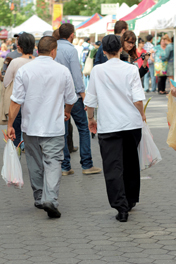
“[Meat is] overused… I do agree with Chef [José] Andrés’ sentiment that [meat’s] reign at the center of the plate is waning. Fruits, grains and vegetables are undeniably the future of sustainability and of healthy eating and nutrition in this country and eventually the world.”
—MARIO BATALI, IN THE CHEF’S NATIONALLY SYNDICATED NEWSPAPER COLUMN (JANUARY 17, 2012)
YEAR: 2010
EVENT: At the end of August, Dirt Candy chef-owner Amanda Cohen becomes the first vegetarian chef featured on the national TV show Iron Chef when she takes on Masaharu Morimoto for the title.
YEAR: 2010
EVENT: New York City Mayor Michael R. Bloomberg proclaims September 19–26 to be official heirloom vegetable week, and on September 23, Sotheby’s holds its first heirloom-vegetable auction, which brings in $100,000-plus to benefit farmers and educational programs for children on farming and cooking.
YEAR: 2010
EVENT: On November 4, BusinessWeek magazine publishes “The Rise of the Power Vegans,” spotlighting the growing number of prominent Americans who have adopted veganism, including former President Bill Clinton, automotive scion Bill Ford, venture capitalist Joi Ito, Whole Foods CEO John Mackey, hip hop pioneer Russell Simmons, Twitter cofounder Biz Stone (who credits a 2000 visit to Farm Sanctuary in upstate New York with his conversion), boxer Mike Tyson, hotelier Steve Wynn, and media magnate Mort Zuckerman.
YEAR: 2010
EVENT: An article titled “Americans Do Not Meet Federal Dietary Recommendations,” published in the Journal of Nutrition, reports that nearly the entire U.S. population consumes a diet that does not meet federal dietary recommendations. For example, 80 percent of Americans consume insufficient fruit, 90 percent consume insufficient vegetables, and 99 percent consume insufficient whole grains. At the same time, overconsumption of solid fats, added sugars, and alcoholic beverages (all representing “empty calories”) is ubiquitous.
“Among the food groups, dark green vegetables, orange vegetables, legumes, and whole grains had the poorest showing, with nearly everyone in each sex-age group failing to meet recommendations.”
—JOURNAL OF NUTRITION (2010)
YEAR: 2011
EVENT: On February 1, talk-show host Oprah Winfrey and 378 of her staff members report the results of their going vegan for a week, which inspires many viewers to take on the show’s Vegan Challenge.
YEAR: 2011
EVENT: In April, a Physicians Committee for Responsible Medicine (PCRM) report indicates conflicts between U.S. dietary guidelines (which recommend eating more fruits and vegetables and less meat and dairy) and its agricultural policy, which channels 63 percent of taxpayer dollars directly or indirectly into meat and dairy production, 15 percent into sugar/starch/oil/alcohol production, and less than 1 percent to fruit and vegetable production.
“As a physician, I urge you to shut down federal programs that pump billions of dollars into direct and indirect subsidies for meat, sugar, and other unhealthy products that are feeding record levels of obesity, type 2 diabetes and other health problems that kill and disable millions of Americans every year. Most taxpayers have no idea that they subsidize unhealthy foods.”
—DR. NEAL BARNARD, PRESIDENT OF THE PHYSICIANS COMMITTEE FOR RESPONSIBLE MEDICINE, IN A LETTER TO THE CHAIRS OF THE HOUSE AND SENATE AGRICULTURE COMMITTEES IN CONGRESS
YEAR: 2011
EVENT: In June, MyPlate replaces MyPyramid as the U.S. government’s primary food group symbol.
YEAR: 2011
EVENT: The National Restaurant Association’s “What’s Hot in 2011” survey of 1,500-plus professional chefs indicates that more than half consider meatless/vegetarian entrées and vegan entrées a “hot trend.” Nearly one in four consider meatless/vegetarian entrées a “perennial favorite.”
YEAR: 2011
EVENT: Sixty-five-year-old former President William Jefferson Clinton (b. 1946), whose love of foods ranging from barbecue to hamburgers during his presidency was well known and who had undergone quadruple bypass surgery in 2004 and stent surgery in 2010, speaks out about his veganism, saying that his vegan diet led to his dropping twenty-four pounds. On CNN, Clinton credits his conversion to a low-fat, plant-based diet with inspiration from a number of doctors, including Dr. Dean Ornish, one of Clinton’s doctors for nearly two decades, and Dr. Caldwell Esselstyn, Jr., both of whom have promoted the ability of a whole-food, plant-based diet to prevent and even reverse heart disease.
YEAR: 2011
EVENT: Independent filmmaker Lee Fulkerson’s documentary Forks Over Knives is released, examining the profound claim that “Most, if not all, of the degenerative diseases that afflict us can be controlled, or even reversed, by rejecting our present menu of animal-based and processed foods.” The film features the personal odysseys of Dr. T. Colin Campbell and Dr. Caldwell Esselstyn. (Long-time vegetarian actress Kristen Bell credits the film with her decision to go vegan, stating, “Forks Over Knives outlines an extremely compelling approach to the prevention of heart disease and cancer.”) The following year, Forks Over Knives: The Cookbook by Del Sroufe is published.
“One of the more convincing, radical and politically volatile docus to come out of the burgeoning good-food genre, Forks Over Knives advocates quite convincingly for the adoption of a plant-based diet, the intent being the eradication of the diabetes, obesity and hypertension afflicting an increasing number of Americans.”
—JOHN ANDERSON, VARIETY (MAY 5, 2011)
“Because of the film Forks Over Knives, more people than ever are looking to try veganism. I’m happy to be a part of the Forks Over Knives Cookbook [whose dessert chapter she wrote], because the better people find vegan food, the more people will stay! Because of the low-fat guidelines, which I don’t typically adhere to, I enjoyed rising to the challenge of using nut butters and avocado as fats, which helped to make the desserts really taste like desserts.”
—ISA CHANDRA MOSKOWITZ, AUTHOR OF ISA DOES IT AND VEGANOMICON
YEAR: 2011
EVENT: The Joe Cross film Fat, Sick & Nearly Dead is released, contrasting two men’s journeys to health via drinking vegetable and fruit juices. In its wake, sales of juice—and juice books—boom.
YEAR: 2011
EVENT: A November 7 New York magazine article by Robin Raisfeld and Rob Patronite announces “Vegetables Are the New Meat.… At serious restaurants all over town, carrots, peas, and the like are no longer just the supporting cast—they’re the stars. Move over locavores, here come the vegivores.”
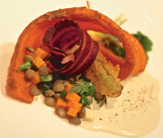
“Ever since [Dovetail] chef John Fraser launched his Monday-night vegetable menu in March, the elegant Upper West Side joint has been fairly jumping on what is traditionally the deadest day of the week, all on account of such proven crowd-pleasers as turnips, parsnips, and salsify.”
—ROBIN RAISFELD AND ROB PATRONITE IN “VEGETABLES ARE THE NEW MEAT,” NEW YORK (NOVEMBER 7, 2011)
YEAR: 2011
EVENT: Filmmaker Marisa Miller Wolfson’s documentary Vegucated, which tracks three meat-loving New Yorkers who agree to adopt a vegan diet for six weeks, premieres at the Toronto Film Festival and wins “Best Documentary.” The audience of four hundred is double the size for that of any other film shown.
“I was amazed at the lengths people were going to in order to live a cruelty-free life. After seeing Vegucated, I understand for the first time ever why people would do this.… It helps me to be able to enjoy cooking for our vegetarian and vegan guests.”
—CHEF MARK LEVY, THE POINT (SARANAC LAKE, NY)
YEAR: 2011
EVENT: Chef Rich Landau and pastry chef Kate Jacoby open the vegan restaurant Vedge in Philadelphia, where it earns accolades as not just one of America’s best new vegan restaurants, but as one of the best new restaurants of the year—period. Their 2013 Vedge cookbook is named one of Entertainment Weekly’s ten best cookbooks of the year.

“There may be no better example of the elevation of humble produce to sexy star of the culinary world than the food at Vedge.”
—COOKING LIGHT MAGAZINE (2012)
YEAR: 2012
EVENT: Publishers Weekly reports that vegetarian cookbooks are being read by others besides vegetarians.
“You don’t have to eat fat to get flavor these days—or any animal products at all. Vegetarian, even vegan, cookbooks are striving to reach more general audiences. And they are succeeding.”
—MARK ROTELLA, PUBLISHERS WEEKLY (FEBRUARY 10, 2012)
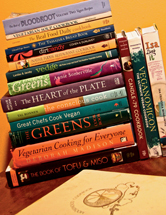
YEAR: 2012
EVENT: By May, law school grad Mark Devries raises more than $15,000 on Kickstarter.com to finish his documentary film Speciesism: The Movie. Inspired in part by the argument by Princeton professor Peter Singer’s book Animal Liberation that “no justifications exist for considering humans more important than members of other species” and the growing “speciesism” movement (which considers animal factories among the greatest evils in our history), the film will premiere in 2013.
YEAR: 2012
EVENT: In a May appearance on The Rachael Ray Show, TV talk show host Ellen DeGeneres and her wife, Portia de Rossi, extol the virtues of their vegan diet, including weight loss and the curing of a skin condition (rosacea) after just two meat-and-dairy-free weeks.
YEAR: 2012
EVENT: In press release issued May 23, the International Food Information Council (IFIC) Foundation’s 2012 Food & Health Survey reports that most Americans (52 percent) believe that figuring out their income taxes is easier than knowing what they should and shouldn’t eat to be healthier. Some 76 percent agree that ever-changing nutritional guidance makes it hard to know what to believe.
YEAR: 2012
EVENT: In May, Microsoft founder Bill Gates sings the praises of companies pursuing plant-based alternatives to meat and dairy, saying, “Companies that are taking the animal products… and actually coming up with a way of using largely plant-based materials—soy, peas, a variety of things—to make these things that are both cheaper, probably more healthy, less cruelty involved, less greenhouse gas emissions.” In 2013, his slideshow on “The Future of Food” extols the companies Beyond Meat and Beyond Eggs.
“[Moving toward a vegetarian diet is] important, too, in light of the environmental impacts of large-scale meat and dairy production, with livestock estimated to produce nearly 51 percent of the world’s greenhouse gases.… Flavor and texture have been the biggest hurdles for most people in adopting meat alternatives. But companies like Beyond Meat, Hampton Creek Foods and Lyrical are doing some amazing things. Their actual recipes are secret, but the science is straightforward. By using pressure and precisely heating and cooling oils and plant proteins (like powdered soybeans and vegetable fiber), you can achieve the perfect flavor and texture of meat or eggs. I tasted Beyond Meat’s chicken alternative, for example, and honestly couldn’t tell it from real chicken.”
—MICROSOFT FOUNDER AND CHAIRMAN BILL GATES, ON MASHABLE.COM (MARCH 21, 2013)
YEAR: 2012
EVENT: In July, a Gallup Poll reports than 5 percent of American adults polled consider themselves vegetarian, while 2 percent identify as vegan—marking the first time Gallup inquires about vegan status.
“Almost all segments of the U.S. population have similar percentages of vegetarians, suggesting that most stereotypes of who is and is not the typical vegetarian in American society have little basis in fact. The biggest distinction seems to come in terms of marital status. Unmarried adults are more than twice as likely as married adults to be vegetarians.… Vegans apparently view themselves as different from, rather than a subset of, vegetarians; most of the small number of respondents in the survey who said ‘yes’ to the vegan question had said ‘no’ to the vegetarian question.”
—JULY 2012 GALLUP POLL
YEAR: 2012
EVENT: In August, Shape magazine names its Top 10 Upscale Vegan Restaurants in America, which include Blossom (NYC), Candle 79 (NYC), G-Zen (Branford, CT), Karyn’s on Green (Chicago), Millennium (San Francisco), Plum Bistro (Seattle), Pure Food and Wine (NYC), Real Food Daily (Los Angeles), True Bistro (Boston), and Vedge (Philadelphia).
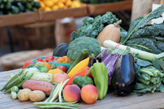
YEAR: 2013
EVENT: In January, Cooking Light magazine names the “Best Vegetarian Restaurant Menus” at chain restaurants. They include Chipotle Mexican Grill, Jason’s Deli, Noodles & Company, Panera Bread, Papa Murphy’s, Pei Wei Asian Diner, P. F. Chang’s, Ruby Tuesday, and Subway, reflecting the widespread availability of vegetarian options even at national chains.
YEAR: 2013
EVENT: On March 4, The Washington Post’s food editor Joe Yonan comes out—as a vegetarian. Yonan writes, “One interview subject, founder of an imitation-meat company, said something along the lines of, ‘The food editor of a major daily newspaper is vegetarian? This is huge!’ And several food journalists have confessed, under their breath, that if it weren’t for their jobs, they’d do the same thing.”
YEAR: 2013
EVENT: In March, LA’s public radio station KCRW’s Good Food, hosted by Evan Kleiman, airs its first-ever all-vegetarian show.
YEAR: 2013
EVENT: In March, GQ magazine’s Alan Richman names the 12 Most Outstanding Restaurants of 2013, which includes vegan Vedge in Philadelphia.
“Every dish [at Vedge] tasted better than I expected it would. Fingerling potatoes with a creamy—no cream, of course—Worcestershire sauce were intense, an attribute of most Vedge dishes.… All the dishes had extraordinary balance and savoriness. Nothing was absent from this meal, and let’s not forget that meat and fish weren’t present.”
—ALAN RICHMAN, GQ (MARCH 2013)
YEAR: 2013
EVENT: LYFE (short for Love Your Food Everyday) Kitchen, a healthy fast-casual restaurant with a more than 50 percent vegan menu, run by former global president and COO of McDonald’s Mike Roberts, opens its doors in Culver City, California, on March 13. Developing the restaurant’s menu are executive chefs Tal Ronnen and Oprah Winfrey’s former personal chef Art Smith. Roberts says he hopes to franchise 250 locations within five years.
“When President Clinton visited LYFE Kitchen, I had the privilege of sitting down to talk with him, and found him so present and so into what we’re doing. He loved our sweet corn chowder, crispy Gardein chicken sandwich, and baked sweet potato fries.”
—TAL RONNEN, CROSSROADS (LOS ANGELES)
YEAR: 2013
EVENT: On April 18, The Wall Street Journal publishes an article titled “La Nouvelle Veg,” which states, “Haute-vegetarian menus are conquering Europe.”
YEAR: 2013
EVENT: In May, P.S. 244—the Active Learning Elementary School—in Flushing, Queens, becomes the first public school in America to serve only vegetarian meals for breakfast and lunch.
YEAR: 2013
EVENT: From May through August, Grant Achatz (whose restaurant Alinea is on Restaurant magazine’s list “The World’s 50 Best Restaurants”) and his executive chef, Dave Beran, serve a twenty-plus-course vegan menu at their Chicago restaurant Next, which since its opening in 2010 has showcased three set menus annually.
“On many plates vegetables can be but an afterthought or quite literally a ‘side dish’—the supporting actor. For our team vegetable driven dishes have always forced us to be more creative. Maybe, we thought, it’s time for vegetables to take the lead.”
—FROM THE VEGAN MENU AT CHICAGO’S NEXT
YEAR: 2013
EVENT: A six-year study of 73,000 members of the Seventh-day Adventist Church (which promotes a vegetarian diet) in the Journal of the American Medical Association reports that vegetarians live longer than meat eaters.
YEAR: 2013
EVENT: In June, the vegan restaurant Kajitsu—which specializes in shojin cuisine, an ancient Japanese culinary practice developed in Zen Buddhist monasteries—is awarded two stars from The New York Times. In his review, Pete Wells writes, “When I eat at Kajitsu… I am never shocked to find that I don’t miss meat or fish. When the Japanese have been working on an idea for hundreds of years, they tend to figure out a few things.”
YEAR: 2013
EVENT: In its August cover story, Food & Wine magazine declares “Vegetables are the new pork, the new cupcake and the new craft beer all in one. They are the biggest mega-trend ever.” The magazine names the twenty best vegetarian and vegan restaurants in America as The Butcher’s Daughter (NYC), Café Gratitude (Venice, CA), Canteen (Portland, OR), Clover (Boston), Crossroads (Los Angeles), Dirt Candy (NYC), Elizabeth’s Gone Raw (Washington, DC), Gracias Madre (San Francisco), Green Seed Vegan (Houston), Green Zebra (Chicago), Greens Restaurant (San Francisco), Kajitsu (NYC), M.A.K.E. (Santa Monica, CA), Millennium (San Francisco), Natural Selection (Portland, OR), Plant (Asheville, NC), Plum Bistro (Seattle), Sutra (Seattle), Vedge (Philadelphia), and Watercourse Foods (Denver).
“The country’s most exciting chefs have become vegetable worshippers.… Vegetables are the future of American cooking.”
—FOOD & WINE (AUGUST 2013)
YEAR: 2013
EVENT: In October, Travel & Leisure names the best vegetarian restaurants in the U.S.: Café Flora (Seattle), Café Sunflower (Atlanta); Candle 79 (New York City); Choices Vegan Café (Miami); Crossroads (Los Angeles); Dell’z Uptown (Charleston, SC); G-Zen (Branford, CT); Green Elephant (Portland, ME); Kajitsu (New York City); Leaf (Boulder, CO); Mana Food Bar (Chicago); Millennium (San Francisco); Mother’s Café (Austin); Natural Selection (Portland, OR); Plant (Asheville, NC); Sage’s Café (Salt Lake City); Samosa House (Culver City, CA); Vedge (Philadelphia); Vegeria (San Antonio); and Veggie Galaxy (Cambridge, MA). Promoting the list, Travel & Leisure Tweeted, “Best vegan and vegetarian restaurants in America? They’re some of the most innovative in the country.”
YEAR: 2013
EVENT: The November 23 Forbes article “Bill Gates’ Food Fetish: Hampton Creek Foods Looks to Crack the Egg Industry” mentioning “newly turned vegan Al Gore” starts to spread the news of the former vice president’s new diet.
“While [Josh] Tetrick, Hampton Creek’s CEO, hasn’t been able to persuade everyone, it’s the type of people he has convinced that has the San Francisco food startup turning heads. Bill Gates is a backer, handpicking the company as one that could change future food production. Tetrick has raised $6 million to date from the likes of Peter Thiel’s Founders Fund, Vinod Khosla’s Khosla Ventures and environment-friendly billionaire Tom Steyer. Newly turned vegan Al Gore is also circling.”
—RYAN MAC, FORBES (NOVEMBER 23, 2013)
YEAR: 2013
EVENT: On December 4, the Intelligence Squared debate “Don’t Eat Anything with a Face” airs live on National Public Radio (see sidebar), with the team arguing “for”—PCRM’s Dr. Neal Barnard and Farm Sanctuary’s Gene Baur—declared the winner.
